
by Thomas E. Watson (pictured), Watson's Magazine, Volume 21 Number 4, August 1915
THE LAWS OF Georgia are extraordinarily favorable to a person accused of crime. He is not only protected in all of his rights under the Constitution of the United States, but he enjoys privileges far beyond those limits. No indictment against him will stand, if it can be shown that a single grand juror was disqualified, or failed to take an oath on that particular case.
Therefore, our grand juries are bound in each case by a special oath, in addition to the usual general oath; and they examine the witnesses in each case, separately, behind closed doors, having the right to call in other witnesses besides those named by the State's Attorney.
The law authorizes the Judge to remove the case to another jurisdiction, himself, whenever the circumstances satisfy him that the ends of justice require it.
If the Judge does not act upon his own initiative, the defendant's counsel can move for a change of venue; and support it by affidavits tending to prove that the feeling in the community is so excited against the accused, that it is impossible for him to therein have a fair trial.
Our Code is also exceedingly lenient in the matter of continuances. The absence of a material witness; the illness of leading counsel, or of the defendant; the want of sufficient time to procure important testimony, are among the grounds upon which accused persons gain time; and these motions are continually being made for no other purpose than to allow for the passing away of whatever local prejudice may have been aroused by the first rumors and exaggerations incident to most crimes of violence.
If the defense is ready for trial, and makes no motion to change venue, each juror of a legally qualified panel is subjected to a rigid examination, as to his freedom from bias and prejudice in that particular case; and the defendant can put each juror, separately, on trial—the Judge being the trior—and offer against the juror such evidence as will prove that he is not, in the eyes of the law, a fair juror to try that case.
During the trial, the defendant may act, wholly or in part, as his own lawyer; he may interrogate the witnesses, and he may address the Court. If he does not choose to make a statement in his own defense, to the jury, he may remain silent; and the law does not permit the State's Attorney to comment upon that silence.
He may write out a statement in his own defense and read it to the jury, or he may tell his story in the usual way of verbal narrative; he can cover almost any ground he pleases, and he can talk as long as he likes; and if he omits any fact, or explanation which his lawyers consider material, they are privileged to direct his attention to his failure to cover that particular point.
After the defendant has finished his statement—of ten minutes, or ten hours—and has been aided by the vigilance of his lawyers, he can say to the State's Attorney:
"I am willing for you to ask me about the case."
But if the defendant does not voluntarily make this offer, the State is not allowed to interrogate him at all.
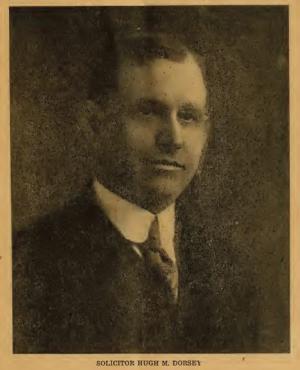
Nor is the State's Attorney permitted, in his address to the jury, to comment upon the fact that the defendant was unwilling to be cross-examined.
In no event, can the accused be put under oath; but our law makes it the duty of the Judge to instruct the jury, that it is their privilege to attach to defendant's statement just such weight as they see fit. They may believe it in part, and disbelieve it in part; they may reject it entirely, or they may accept it entirely; they may disregard all the sworn testimony in the case, and rest their verdict on the UNSWORN AND UNCORROBORATED STATEMENT OF THE ACCUSED!
In all the legislation mercifully designed to protect innocence, and to give to a man of good character the golden opportunity to stake his word against the oath of unreliable witnesses, there is nothing which surpasses the Code of Georgia.
Time and again, I have seen a defendant at the bar rise, like a lion from his lair; and make a manly, ringing, indignant statement to the jury, and shake off from himself the evidence of circumstances, or of perjury, as easily as the leonine monarch shakes the dew drops from his mane.
Again and again, during my quarter-of-a-century in the court-house, I have seen my clients, and other lawyers' clients, confound the prosecution, by facing the Court and country, and saying, with the boldness of conscious innocence—
"Cross-examine me to your heart's content; I have nothing to hide, and nothing to fear!"
Such a waiver of legal screenage, half wins the battle, the very instant the defendant makes it.
Let me say at this point—in order that you may enter the case properly informed—that the attorneys of Leo Frank were the most experienced and most competent members of the Atlanta bar; thoroughly familiar with local affairs, local prejudices, local politics, local ins and out, of all kinds; and yet they did not move to continue the case, nor did they ask for a change of venue; consequently, those Atlanta lawyers were not aware of any "mob spirit," at that time.
Afterwards, it became necessary to manufacture things which had not existed; and the "mob spirit," which Frank's able attorneys had been ignorant of, was found somewhere in a small phial; was released, expanded, blown upon the four winds, until it became greater than the Djin of the "Thousand Nights and a Night."
Those who continue the cry of "mob spirit," and "jungle fury," and "psychic intoxication," convict Frank's lawyers of not knowing their own business; for if a tithe of what is asserted, was ever capable of proof, Rosser and Arnold grossly mismanaged Frank's case.
Let me say further, by the way of preliminary, that the defendant listened during the eight hours' cross-examination of his alleged accomplice; that he listened, day after day, and week after week, while his own trusted employees, and former friends gave evidence which linked around him the chain of circumstances; that he saw and heard the eleven white girls who swore that his character for lewdness was bad; that he listened to the white girls who swore to his lascivious conduct, in their dressing-room, and to his taking Rebecca Carson into the ladies' private room, during work hours, and remaining inside, alone, with her for fifteen or twenty minutes; and that he sat silent while his negro trusty, of two years' standing, told the jury how he would peep through the key-hole, and watch Leo Frank commit sodomy with Daisy Hopkins; yet when this educated young man, this graduate of Cornell, at last took the stand to make a statement in his own defense, he drew around himself the screenage of our most lenient Code, and did not dare to say to Court and country—
"I am willing to answer questions!"
In all that month of tedious, desperate conflict, Leo Frank was the only person involved who escaped the ordeal of cross-examination, excepting the eleven white girls, whom his lawyers dared not interrogate.
The State cannot go further than to inquire whether the defendant's character is good or bad; but the defendant can go into particulars, and can inquire of the witness, "What is it, that you know against me?"
But in this case, Leo Frank did not put the white girls to the trouble of pulling the cover off his double life. He and his lawyers were only too glad to let the ladies go, without a word, after they had sworn that he was bad.
It should deeply impress you to learn, that eleven unimpeachable and disinterested white witnesses testified to Frank's double life; and that what they knew of him was learned by them in his place of business, where Mary Phagan came to her death; and Frank was so certain the eleven white witnesses would only make it worse for him on cross-examination, that his lawyers were afraid to ask those women what it was they knew!
Is that the conduct of innocence?
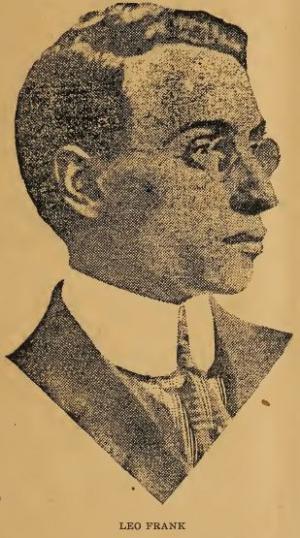
On Memorial Day, 1913, (April 26th) Mary Phagan left her mother's home, shortly before noon, after having eaten dinner; and she was dressed in such cheap finery as a girl of her humble station in life could afford. She took the street car on her way into the city, and left it at a point some 300 yards from the National Pencil Factory, where she worked. On account of their running out of the metal tips, she had been laid off that week, after Monday; and she was now on her way to the office to get her Monday wages because Frank, the Superintendent, had refused to send it to her by her friend, Helen Ferguson, the day before, when Helen asked for it, as she had often done previously.
When last seen, Mary was within two blocks of the factory (to which two or three more minutes' walk would have carried her), but no one saw her when she entered it.
That night, her people gave out the alarm, for they at once suspected foul play. Mary was not quite fourteen years old; and had never been irregular in her habits, nor ever out of nights; and her failure to return home created the most distressing anxieties and forebodings.
The police were notified, and a search for the missing girl commenced. At first, it was believed that she had overstayed herself with some party of friends, enjoying the holiday; and there were vague reports of her having been seen, first with one companion, and then with another. But none of these rumors proved well-founded; and the dread apprehension of something tragic grew stronger and stronger in the household of the mother, and also among the police.
During all of that evening of the efforts to locate the missing girl, nobody appears to have thought of calling up the Leo Frank house, and asking him had he seen her. True, he would not have been found at home; he was spending that particular afternoon alone in the factory, but neither Mary's folks, nor the police suspected it.
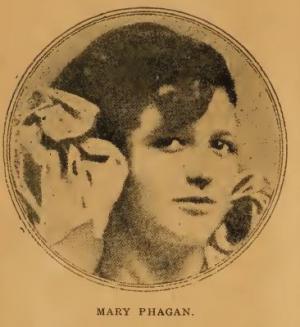
Let us now turn our attention to Frank, and follow his movements that Memorial Day morning. In parting from the night watchman, Newt Lee, who of course went off duty early, Frank asked him to return that afternoon at 4 o'clock. Frank explained that he wanted to get off earlier than usual.
During the morning (Saturday, 26th), several employees, and relatives of employees, came to get wages due, and got them from Frank. Two men, Denham and White, were at work on the fourth floor, tearing down an old partition and putting up a new one. Necessarily, they made a deal of noise at this kind of work; and they were doing it some 200 feet back from the elevator shaft and stair-landing. Consequently, they were the less apt to hear a scream two floors below, or to hear the sound of a fall, or to hear the elevator, if it ran.
The wife of one of these workmen (Mrs. Arthur White) came to the factory to see him at 11:30, and unexpectedly returned at 12:30. She was not an employee, and did not know Jim Conley.
But Mrs. White, and two white men (Graham and Tillander) swore that they saw the negro, sitting not far from the foot of the stairs, on the first floor, where Conley worked, and where he generally sat when idle.
Frank's office and place of work was on the floor above; and his desk was in the inner room, while the safe was in the outer. The time-clock was near by, and it was Frank who put in, and took out, the slips of paper on which the punches were registered.
Frank stated, again and again, that he left his office at about 11 o'clock that morning, and went to his Uncle Montag's place of business; and that, after his return to his office, he never left it at all, until he went home to dinner, at about 1 o'clock p.m.
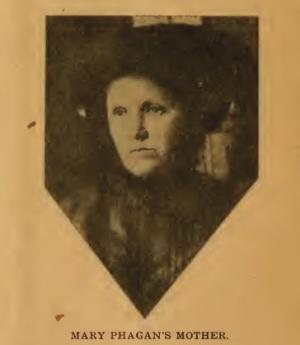
He did go to Montag's, and a white lady, of the most unquestionable character, made affidavit to the fact that she saw him and Jim Conley in close conversation at about 11 o'clock, near Montag's place.
This bit of testimony is of superlative importance; and the defendant was never able to shake it in the least.
It shows that the Jew was talking in a secretive, confidential manner with the negro, on the sidewalk, where he thought he was unobserved—and this negro had been his trusty for two years! This is the same negro upon whom such a torrent of vituperation was afterwards poured, when it became necessary to find a scapegoat for Leo Frank.
The story, invented long afterwards, that Conley was drunk, and was "hiding behind some boxes in the gloom," is exploded by two white ladies—Mmes. White and Waits—and by two white men—Messrs. Graham and Tillander.
Taking those four witnesses—who have no interest whatever in the case, and whose characters are entirely above attack—is it not clear to your mind that both Frank and Conley were on the scene of the crime that Saturday morning, and that each man knew the other was there?
Besides, if the stenographer did not misunderstand Harry Scott, Frank told him, on the Monday following the crime, that Conley was in the factory that Saturday morning.
As the whole argument pivots upon this vital fact, let me quote Harry Scott's exact language, from page 80 of the record:
"I knew on Monday that Mrs. White claimed she saw a darkey at the factory. I gave that information to the police department. Mr. Frank gave me the information the first time I talked with him." (Monday afternoon.)
Bear in mind, that Scott was a Pinkerton detective, whom the Pencil Factory had employed to ferret out the crime; and that Scott was on the job, as a friend to Frank.
According to medical testimony, Mary Phagan's death occurred in less than 45 minutes after she ate her dinner. The experts claim that the condition of the stomach proved this. But waiving all questionable evidence, we come directly to what Leo Frank said—said with careful consideration, knowing that his words were being written down.
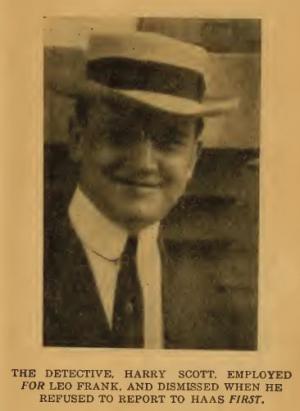
After the girl's body had been found inside his place of business, and the rigidity of the remains showed that she must have been killed many hours before she was discovered, necessity compelled Frank to admit that she had come into the building that Saturday afternoon. There was no way out of it; the corpse was there; consequently, the living girl had come.
But, when?
The State followed her from her mother's, and onward in the street-cars, to the corner of Marietta and Forsyth Streets; and then traced her within two blocks of the factory, going in that direction, and in less than four minutes' peart walk of its door.
Watches and clocks varied, as they always do, but the time was right around the noon-hour.
With the stiff, cold body in his place of business that night, and the girl walking toward the door somewhere near midday, Frank was necessarily compelled to fix a time, at least approximately, for her arrival.
And he did so. He told Chief Lanford that the girl came to him for her money "at from 12:05 to 12:10, maybe 12:07."
His stenographer swore she punched the time-clock, and went away at 12:02; and Frank said that the girl who was killed came next.
He did not know that another girl had come, at that identical time, 12:05, and had remained until 12:10; and had searched both offices for Leo Frank, without seeing him, or hearing him; and without seeing or hearing anything of Mary Phagan.
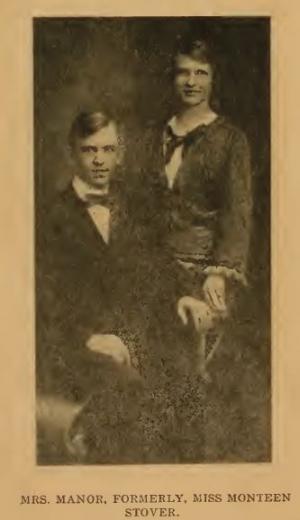
This girl, whose visit to his vacant office was unknown to Frank, proved the most invincible link in the chain of circumstantial evidence against him.
When he afterwards learned the time of her visit, he changed the time of Mary's; but he only sunk deeper into the mire, as will be shown you later.
The sum of one dollar and twenty cents was due Mary, and she not only wanted that pitiful sum, but wished to know whether there would be work for her, the following week. Therefore, she came and got her pay envelope, and asked her employer—"Has the new metal come?" This was the same as asking, "Will there be work for me next week?"
Frank told his detective that he answered the girl by saying, "I don't know."
The room in which Mary worked, putting the metal tips on the pencils, was on the same floor as Frank's office. It was some 200 feet away, and a door cut it off from the intervening space.
The toilet for men and women was back there, beyond where Mary worked; and the men's part of the closet was separated from that of the women by a thin partition.
In going to his toilet, Leo Frank had to pass close by Mary Phagan; where she sat at her machine; and he had been doing this, daily, for many months. There were only four girls who worked in the metal room, and Mary was one of the four.
Remember this, for after the dead body was found, Frank claimed that he did not know whether a girl named Mary Phagan worked for him or not. He said he would have to consult his books!
Now, let us return to Frank's office, which he claims not to have left at all, after his return from Montag's. He told Harry Scott, in the hearing of John Black, that he was in his office continuously, from the time Hattie Hall, the stenographer, left at 12:02, on until Mrs. White saw him in the outer office at 12:30.
Mark you, Frank and Conley are both visible at 12:30, one upstairs, and the other down. Only about thirty feet of space separates them.
For the present, we will not concern ourselves with the question as to where they were after 12:30, but will ask, Where were they between 12:02 and 12:30?
Within that brief period of less than half an hour, lies one of the blackest crimes on record. Within that brief and guilty period, Mary Phagan enters into the possession of Leo Frank, in his private office, according to his own statement.
He does not claim that the girl had ever spoken to the negro, or had anything to do with him, or was in his power that fatal day. He admits that the girl safely passed the negro, as Hattie Hall had done, as Mattie Smith had done, and as Mrs. White had done, that same day, and near the same time.
He admits that the doomed girl arrived unmolested, in his private office, where the two were alone, with no persons nearer to them than the negro servant down stairs, and the two hammering and banging carpenters, two floors above, and 200 feet back.
He admitted to Chief Lanford, and swore to the Coroner's jury, that Mary Phagan went into his office, power, and possession, at a time that he variously fixed at from 12:05 to 12:15.
Then, where was Mary, that Monteen Stover could not see her, when Monteen was in the office, from 12:05 to 12:10?
And where was Frank?
The State contends that when Mary inquired, "Has the metal come?" Frank answered, "I don't know," and that he took her back to the metal room, on the pretense of looking to see whether the metal had come. As they passed into the room, Frank closed the door behind them, thus giving them freedom from interruption, for no one was at work on that floor on this legal holiday.
In his statement to the jury, Frank said that, if he was not in his office at the time Monteen Stover swore he wasn't, he might have unconsciously gone to the toilet.
The adoption of the theory not only gives him an unconscious spell of five minutes, but places him in the metal room, where Mary Phagan's blood and hair were found. It not only places him at the place where Mary was assaulted, and then killed; but places him there at about the time it was done!
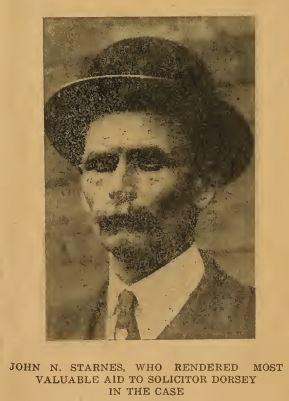
In his desperate effort to escape the logical consequences of Monteen's evidence, he runs into a position equally desperate.
To place himself where Mary was attacked, at the time she was attacked, is about equivalent to a confession that he was either the principal or the accessory in that attack.
To arrive at a correct idea of the manner in which Mary was assaulted, we must have recourse to the testimony of Doctors Harris and Hurt.
Taken together, they show that the girl was struck a violent blow, in front, which did not cut the skin, but which gave her a blue-black eye—just such a blow as a clenched fist usually gives. In the back of her head was a cut to the bone, 2 ½ inches long, "ranging from down upward."
These two blows had been inflicted before death, and at practically the same time. The blow on the back of the head had rendered the girl unconscious.
There was blood caked in her thick, long hair; there was blood on her drawers, and there was blood on her private parts. There was evidence of violence and some sort of penetration, in the vagina, and this penetration appeared to have been made just before her death. The uterus was that of a virgin, and there was no evidence of pregnancy.
Her drawers were not only bloody, but torn, all the way up; and a strip of her under-garment had been torn off.
This strip had a soft knot tied in it, as if it had been made a sort of pad to catch the blood; and this pad had soaked up the blood, and was full of it; therefore it had been under the cut in the head!
In the removal of the body, the strip had slipped; and it was found lying loosely around the girl's neck, where it served no purpose of the murderer, for the cord did all that was necessary.
For the present, we will continue ourselves to these physical details, and endeavor to ascertain what they mean.
Unless we are ready to believe that this pretty little white girl, dressed for the Memorial Day, was more filthy in her personal habits than the commonest wench, you will reject with disgust the contention of Governor Slaton, that the blood stains came from her monthly sickness. No bandage was on her person, and her under-clothing was violently torn—and she was bloody, and there were signs of violence inside the vagina, do you doubt that some sort of sexual attack was made upon her?
Be that as it may, the wound which ripped her scalp to the bone bled somewhere; and the question is, WHERE?
To cut the inquiry as short as possible, I will say that the evidence in the record fails to show any blood, anywhere, except on the first floor, at the ladies' dressing room, not far from the metal room door.
The immense importance of the blood-marks begins to be obvious, when the record discloses the fact that the metal room and first floor had been swept up on Friday evening, preparatory to the legal holiday which would close it until next week.
The men who cleaned up the place swore positively that there were no unusual marks on the floor Friday. Mell Stanford swept the floor, every foot of it, and was emphatic in his testimony. Equally emphatic was R.P. Barrett.
Both these men were satisfied employees of Leo Frank; and when these two white men, early Monday morning, made the outcry about the blood on the floor, neither one of them had the slightest idea that their discovery would hurt Leo Frank!
They found the blood, and they immediately made the outcry, but they did not know whom it would implicate in the crime. Please remember this.
At that time, Leo Frank had not been suspected, much less accused; and at that time, he was endeavoring to fasten suspicion and evidence of guilt upon Newt Lee, the night watch.
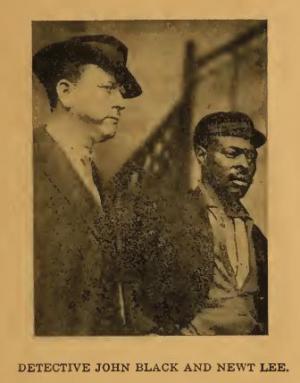
These tell-tale marks on the floor caused excitement among the officers and employees of the factory, and every one could see that an effort had been made to hide the blood by smearing a white substance over it—haskoline.
Of course, the attempt to conceal the spots had made them the more conspicuous; and there was absolutely no conflict in the testimony as to some sort of spots on the floor, and some sort of white stuff smeared over them.
To say that the accusing spots were on the floor Friday, is to impute willful perjury to two of Frank's friendly and intelligent workmen—a perjury without motive, and against their own interest.
To say that the accusing spots were not on the floor, Friday, imputes perjury to no one, for no one swore that the spots were there, Friday.
Following the rules of law, we are forced to accept the positive evidence, that the spots were not on the floor Friday, but were there Monday morning.
Then we come face to face with the question—
How came the spots on the floor?
Say that they were made by paint: who spilled the paint, on that floor, after Friday, and before Monday?
Produce the man, the woman, the boy, or the girl!
The defense could never do it, and cannot now do it.
Say that the spots on the floor were made by blood: who spilled the blood, on that floor, after Friday, and before Monday?
Produce the person who did it!
The defense was unable, and is now unable, to produce such a person.

What, then, is the conclusion of inexorable logic? Nobody did it, excepting the one man who does not dare to acknowledge that HE did it!
That he may have had an accomplice in it, does not alter the state of the case.
Reasoning by the process of exclusion, we will say, quite naturally, that if any person, innocent of crime, had spilled that blood (or paint), and had hurriedly tried to cover it with white powder, the innocent person would have come forward, when the hue and cry went forth, and would have said—
"I'm the person who made those marks on the floor, after Friday and before Monday; and I will tell you how I came to do it."
More especially would an innocent person have done that, had he seen another innocent person endangered by the failure to account for those damning spots.
But when no person comes forward to innocently explain what is the inference?
It is, that those spots show somebody's guilt; and the somebody who is responsible for the spots, is afraid to say, "I made them!"
Where does that process of reasoning take us? It takes us to Leo Frank, as the only person in the building who dares not come forward and tell how he came to make them and why he tried to hide them.
IT WAS MARY PHAGAN'S HAIR.
Let us go a step farther, and see what was found in the metal room, early Monday morning.
Frank's machinist, R.P. Barrett, had been at work in the metal room until quitting time Friday evening, and he left a piece of work in his machine. Immediately upon his return, Monday morning, he noticed on the handle of his bench lathe, some strands of hair, swinging down. He at once called attention to it; and the strands of hair were seen and examined by numerous employees of the factory.
The hair was almost immediately recognized as Mary Phagan's, for the only other girl there who had hair like Mary's was Magnolia Kennedy; and Miss Magnolia had not been in the factory, at all, after Barrett quit work Friday.
One of the girls went running to the others, exclaiming, "They have found Mary Phagan's hair on Barrett's machine!"
All this was on Monday morning, when the general agitation had taken no definite direction; and when the men and girls in the factory were expressing themselves spontaneously, and truthfully, without a thought of saying a word that would implicate the Superintendent, Leo Frank.
Please bear this in mind!
There was no "frame up" against anybody, in the outcry about the blood and the hair, for at that time nobody had any idea of who was guilty.
As the hair was not on the handle of Barrett's machine, when he took his hands off it, Friday evening; and as the hair was on the machine, Monday; and as the hair showed for itself that it was a woman's; and as the girls who knew Mary said it was hers, we must believe it was hers, unless some girl, or woman, came forward and said, "The hair is mine, and I will tell you how it came to be on the handle of Barrett's machine after Friday."
There were 100 girls and women at work in the place, and only one of them had hair like Mary's; and this one girl (Magnolia Kennedy) said on oath that the hair was not hers, but seemed to be Mary's. What follows?
Unless some outside woman's hair got on Barrett's machine, after Friday, we must conclude that the hair was Mary's.
It is impossible to suppose an outside woman, for if one had come to meet Frank, or any one else, after Friday, either Frank, or the woman, or both, would have given that explanation, and ended this part of the case.
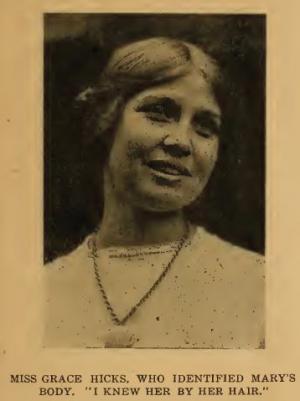
Isn't that perfectly clear to your mind? Let me state it, again:
If Frank had an assignation with some outside woman, and took her to the metal room, where her hair might have dropped on the handle of the machine, is it conceivable that he would fail to thus account for the hair?
If any other man had such an appointment with some outside woman whose hair might have got on the machine, would not that man have come forward to save Frank?
Why did no such man, and no such outside woman pretend to have been the cause of the hair on the machine?
Because no such man, and no such woman existed.
Then we reason ourselves right back into the factory, and we say, that the long strands of woman's hair, of that peculiar golden-brown color, came from the head of one of the 100 girls who worked there; and that, as not one of these girls can be induced to even pretend that the hair was hers, we are under the logical compulsion of saying it was Mary's.
Those who would have claimed it, had it been theirs, will not; therefore, the hair didn't belong to any of them. But it had belonged to somebody, and as that somebody cannot be found by the defendant, or by the defendant's lawyers, or by the defendant's detectives, or by the defendant's partisans, we are driven to the conclusion that this undiscoverable somebody was Mary Phagan.
Did the defense attach importance to this finding of the woman's hair on the handle of the machine? Did the able lawyers of Frank endeavor to account for the accusing strands? They did. They struggled to get away from the hair, as hard as they struggled to escape from the blood. What explanation did they offer?
They proved that the girls sometimes combed and did up their hair, not far from Barrett's machine; and they argued that some woman, doing this, might have flung her combed-out hair, in such a manner that it fell on the crank handle!
Very well, produce the woman with that kind of hair! The defense is unable to do so.
But the State goes farther, and says to the defendant, produce ANY GIRL, OR WOMAN, who was in that room after Barrett left his machine Friday!
Again, the defense is unable to do it.
What follows? Of logical necessity, it follows, that as some woman, or girl, was in that room, after Barrett stopped his machine on Friday, and as no living girl or woman can be produced, the girl who was there is not alive!
Even the sapient Burns realized to the full the enormous weight of those six or eight strands of woman's hair, swaying upon the handle of Barrett's machine, for Burns' man, Lehon, gave out a statement, which was thus reported:
Burns' Detective Declares Hair Was Placed by Reporter to Get "Scoop" in Frank Case.
Special to The Washington Herald.
San Francisco, March 20.—Evidence which it is claimed will clear Leo M. Frank of the charge of murdering little Mary Phagan, in Atlanta, on April 26, 1913, is in possession of Dan Lehon, a New Orleans detective, now in San Francisco.
"One of the most startling bits in the chain of evidence which the State wove about Frank was a strand of hair found on the second floor of the factory," said Lehon today.
"I am prepared to prove that the lock of hair was placed on the handle of a lathe by a newspaper reporter for the sake of a sensational ‘scoop.'"
In March, 1915, Burns and Lehon were "prepared to prove that the lock of hair was placed on the handle of a lathe by a newspaper reporter."
Prepared to prove it, you see!
The Burns Detective Agency had abandoned in despair the efforts to find a girl who would say that she went to that metal room after Friday evening, and that the hair might be hers.
To find such a girl, is doubly difficult, for the reason that Mary's hair and the hair on the machine matched; and that no other girl in the factory had that kind of hair; and it was not only necessary to discover an outside girl with hair like Mary's, but a girl who could swear to an arrant falsehood without being caught in it.
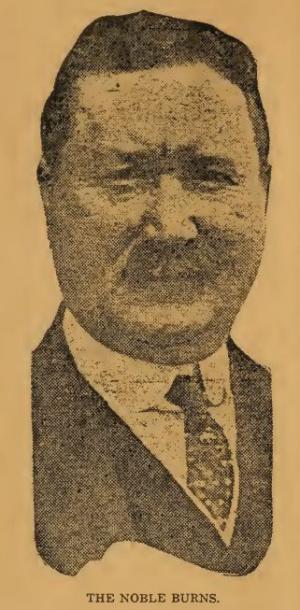
Consequently, the noble Detective Agency abandoned that line, discouraged by the exposure of the bungling briberies of Epps, Duffy, Ragsdale, and Barber.
They leave the girls, and discover "a newspaper reporter!"
Well, where is he? Who is he? Why hasn't he been produced? The Prison Commission would have been glad to hear the gentleman.
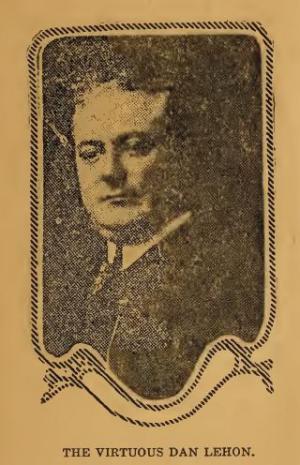
The Governor would have been overjoyed to welcome such an ally.
The crime was not known to any reporter until Sunday morning; the hair was found Monday morning at 6:30 o'clock; how did the reporter get into the room Sunday, without being seen? How did the reporter get the hair? Where did he get it? Did he pull it out of Mary's head in the basement, or did he go to the morgue after it?
Tell us who is the reporter that remained silent during all that prolonged trial of Leo Frank, during all the months of effort to find new testimony, during the year and more that the case has travelled from Judge to Judge, from court to court, from courts to Prison Commission, and from Prison Commission to the Governor!
Hard-hearted newspaper reporter! who must necessarily have been an Atlanta man, working for one of the Atlanta papers, which have been so partial to Leo Frank!
Apparently, Burns and Lehon give the public no credit for common sense. These brazen rascals have given out statement after statement, audacious falsehoods, told with confidence and repeated with brazen insistence, because the State of Georgia had no press agency to defend her—and her Governor was a partner of the law firm defending Leo Frank!
The Governor himself was mightily worried about the hair; and when he signed the 15,000-word mass of incoherences which sought to justify his commutation of the sentence, he gave the public to understand that Dr. H.F. Harris had virtually destroyed the value of that part of the State's case.
What is the truth of the matter, as shown by the official record?
The grave of Mary Phagan was opened, and some of the hair taken from the head, ten days after her death. At the morgue, the undertaker, Gheesling, had cleansed the girl's head and hair, by washing it out thoroughly with tar soap.
Now, the Doctor was asked to make a microscopic examination of the two tresses of hair; the one found on the handle of the machine; the other, taken from the exhumed body.
This is what Dr. Harris said—
"Affiant further says that the two specimens (of hair) were so much alike that it was impossible for him to form any definite and absolute opinion as to whether they were from the head of the same person or not."
Were there ever two drops of water, grains of sand, leaves of trees, scales of fish, or strands of hair, exactly alike?
Are any two hairs of your head precise duplicates? Is there not a slight variation of texture and size in every two hairs out of every person's head?
When Dr. Harris' microscope failed to reveal any decided difference in color, size, and texture, between the tress that came from the grave and the one which came from Barrett's machine, you may feel as certain as you need feel about anything, that the two tresses were once a portion of the same head of hair.
That which we do not see, and do not learn from others who do see, we must learn from proved facts which convince us to a moral certainty; and when the microscope failed to show any difference that a conscientious examiner could swear to, the jury was bound to believe the hair was the same, unless the defendant could offer some evidence going to show that some other person dropped the hair on the machine.
Until the defendant made some effort to identify some other person whose hair got on the machine in some way, after Friday, it would not have helped the defense, even if Dr. Harris had sworn that the hair on the machine was not the same as that taken from Mary Phagan's grave; for the simple reason that the State, and the jury, would immediately have said—
"As you claim that it is different hair, there must be another girl whom you had in your employ, and whom you can produce. PRODUCE HER!"
So, it must be apparent to you that, if Dr. Harris had testified as Governor Slaton insinuated, the defendant would not have been relieved, unless he could produce the other girl. And if he could have produced the other girl, he did not need the evidence of Dr. Harris.
Which ever way you take it, you find yourself going round to the same conclusion: the hair was Mary's, because they could not prove it to be anybody else's; and it had to be somebody's.
Produce the girl who went back there and combed her hair. It can't be done. Produce the woman who went back there, and did up her hair. It can't be done. Produce the girl, or the woman, who will swear that the hair might have been hers. IT CAN'T BE DONE!
They could monkey with the cook, and squelch her; they could monkey with the keeper of the lewd house, and run her out of Atlanta; they could buy poor old Ragsdale, and E.L. Barber; but they were utterly unable to prevail upon any woman to testify that the hair on Barrett's machine might have been hers.
For Heaven's sake, use your common sense! What is the ONLY solution as to the hair, WHEN NOBODY will claim it?
The only possible solution is, that the girl who could have claimed it, IS DEAD! Dead in her tender youth, in the flower of her maidenhood, in her glory of virginal purity—dead, as your little girl, some day, if other Leo Franks escape just punishment, through the machinations of Big Money.
Tell us this—O tell us this!—If that hair on Barrett's machine came from the tresses of some girl who was still alive at the trial, why in God's name, shouldn't she have come forward, and claimed it?
There was nothing to disgrace her. She could have said she went to the toilet. She could have said she stood there, by the machine, doing up her hair. She could have said that she idly let a few strands fall, and that they might have caught on the handle of the machine.
There was no disgrace to fear—why didn't the girl come forward?
There is but one answer:
The girl was dead!
If, in Mary's uplifted, horrified, frantically opposing little hands, there had been found some hair, from the head of the simian Jew who was assaulting and killing her, the evidence wouldn't be a bit stronger.
Governor John M. Slaton had before him the undisputed testimony of the only possible girl, excepting Mary, whose hair it could have been; and this girl swore it was not hers, but seemed to be Mary's.
When the only other possible girl swears herself out of it, what does inexorable logic say? Exclude every other person, and you have Mary Phagan.
It was Mary who was there, Saturday; and she asked Frank a question which suggested a visit to the metal room!
Governor Slaton admits that if it was her hair, it furnished the highest and best evidence of Frank's guilt.
Does it? Then Frank's guilt is demonstrated.
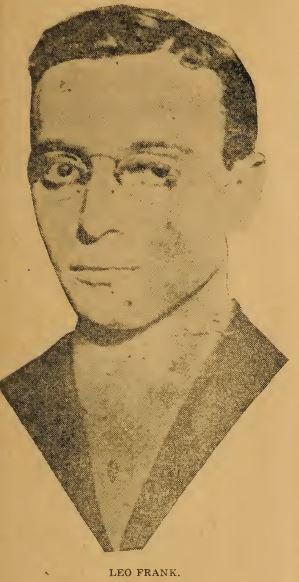
Again I repeat, we lose Frank and Mary at 12:05; and we locate Frank again at 12:30, standing in his outer office, at the open safe, and starting nervously when spoken to by Mrs. White; but we do not find Mary any more, until 3 o'clock that night, when the night-watch, Newt Lee, in making his rounds, has a call of nature, while down in the basement, goes to the toilet there, and the light of his lantern happens to fall upon the white legs of the dead girl—her dress having been partially thrown back as she was dragged by the heels, over the dirt floor.
Newt Lee rushed up the ladder, and through the trap door, got the police headquarters over the telephone, and called for the officers to come at once: he told them he had found a dead white woman in the basement.
They rushed to the place, went to the basement, and examined the body. It was lying on the side face, almost on the face; and the face itself was dark with congested blood, and with the dirt over which she had been dragged. Her tongue was out of her mouth, and around her neck was a thick twine cord, tied so tight, that it had sunk into the flesh.
Her arms were in a fixed position, folded across the breast. She was rigid all over. Near the body, lay her hat, shoes, and handkerchief. Near, also, were two notes, which purported to have been written by the girl to her mother, describing how the tall, slim night watch had seized her as she went to the closet, and had thrown her down the scuttle-hole into the basement.
Thus, the notes directed suspicion to Newt Lee.
We may dismiss at once the idea that Newt Lee could have been guilty, but we must not forget that the notes accused him, positively and circumstantially. If we afterwards learn from the record that Frank caused Lee's arrest for the crime, and fabricated a time slip for Saturday night, which gave Lee a period of the night unaccounted for on the clock—a sufficient period for him to have gone home and changed his shirt; and if we further find that Frank hinted, and insinuated against Lee, until they searched his premises and found a bloody shirt in Lee's clothes barrel—if we shall hereafter learn all this from the record, we will be getting close to the man whose active brain dictated those notes.
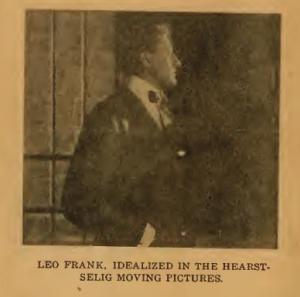
When the officers had completed their hasty examination of the body, they went to the telephone, and rang up Leo Frank's house.
Newt Lee had already tried for several minutes to get a response from somebody at Frank's house, but had failed. The officers tried, long and earnestly, and they also failed. No one would answer.
WHAT WAS FRANK'S TRUE CHARACTER?
Before we go further, let us see what the official record proves, as to the moral character of Leo Frank, of whom the veracious Burns recently said—
"And it made them angry when I offered $5,000 reward for the slightest evidence showing immorality in all of Frank's life. That offer still stands, and has never been sought—and still the stories continue in Georgia that he is a pervert.
"I have never known a cleaner, more honest, more God-fearing man than Leo Frank. Only his abiding faith in his God has, according to my belief, kept him up through the ordeal he has experienced. And that faith will be rewarded, for he will be proven innocent."
Burns' money, the "offered $5,000," is somewhat more unattainable than the bag of gold that you can get, if you will hasten to the end of the rainbow. If anyone was ever silly enough to become "angry," when Burns "offered $5,000 reward," I never heard of it. To try to get blood out of a turnip, would be a sensible experiment, compared to an effort to get that money out of Burns.
What says the record—leaving Jim Conley out of it—concerning Frank, than whom the garrulous Burns has never known "a cleaner, more honest, more God-fearing man?"
The author of the Governor Slaton document says that 100 witnesses swore to Frank's good character, and less than a dozen testified he was lewd. The world is therefore expected to believe, that the overwhelming weight of the evidence was in favor of the chastity of the accused.
Out of the hundreds of people who are acquainted with young men about town, how many really know their secret sins? How many could swear to anything disgraceful?
When 100 Jews go upon the stand, and give Frank a good character, they no doubt are perfectly honest about it; but when ten white Gentile girls swear they had worked at the pencil factory for years, and that Leo Frank's character for lasciviousness was bad, the jury must not disregard this positive testimony, and rely upon the 100 negative witnesses.
And when the cowering defendant dares not put a single question to those positive witnesses, their evidence against his character, based on personal knowledge, must be accepted.
Miss Myrtice Cato and Miss Maggie Griffin testified to Frank's habit of taking Rebecca Carson into the ladies' dressing room, on the fourth floor, during work hours, and the attorneys of Leo Frank did not dare to ask those white girls a single question.
C.B. Dalton admitted, under oath, that he and Frank had frequently had a woman of the town in the factory, and that he had even gone to the basement with her.
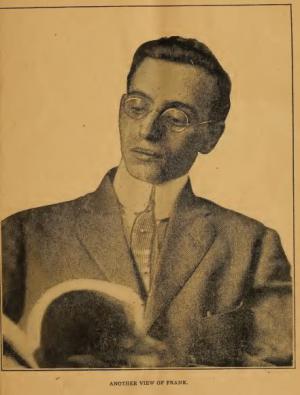
The woman from the outside, with whom Frank was alleged to have indulged in unnatural vice, was Daisy Hopkins, and the defense had to put her up.
Daisy denied it, of course; and on cross-examination she gave the following remarkable testimony:
"I have never been in jail. Mr. W.M. Smith got me out of jail.
"I don't know what they charged me with. They accused me of fornication."
However, when Jim Conley peeped through the key hole, and saw the sight which he swore he saw, you might read page 55 of the record, not for evidence of the guilt of Frank, but to obtain an idea of a pervert. If you will read the Old Testament account of the destruction of Sodom and Gomorrah, you will have a clear vision of the darker slime of this case. I do not care to quote the evidence, but merely cite you to the page. (You can find it also on page 285, 141st Georgia Reports)
So much has been said about Frank's chaste character—a pet of the Rabbi, a favorite of Cornell, a model husband, &c.—that I will give you a little glimpse into Nellie Wood's evidence:
"Question: Do you know Mr. Frank?
Answer: I worked for him two days.
Q. Did you observe his conduct toward the girls?
A. His conduct didn't suit me very much.
Q. You say he put his hands on you; is that all he ever did?
A. Well, he asked me, one evening—I went into his office, and got too familiar and too close.
Q. Did he put his hands on you?
A. Well, I did not let him complete what he started. I resisted him.
Q. Did he put his hands on your breast?
A. No, but he tried to.
Q. Well, did he make any attempts on your lower limbs?
A. Yes, sir.
Q. And on your dress?
A. Yes, sir."
Miss Nellie Wood quit, immediately, and never went back, except to get her pay for the two days.
Miss Nellie Pettis gave testimony equally damaging. She told how Frank had leered at her, winked at her, showed her money, and finally asked, "What about it?"
Miss Nellie's language was unusually vigorous; she told Frank to go to hell!
In a Good Shepherd house, in Cincinnati, there is a poor girl who worked for Frank, and he ruined her.
In a Florence Crittenden Home, in Georgia, are two poor girls who worked for Frank, and he ruined them.
How many other girls he ruined, he knows; but all that we know, is that the State produced eleven more that he wanted to ruin.
Mary Phagan was another.
(In the absence of the jury from the court-room, Judge Roan allowed the girl from Cincinnati to tell how Frank had debauched her; and how unnatural his manner of satisfying his passion was; and she spoke of a scar on her inner thigh made by his teeth.
To understand what sort of creature the evidence in the case proved Frank to be, you would have to read some treatise on moral degeneracy—such a book, for example, as Psychopathia Sexualis.)
HAD HE LUSTED AFTER MARY?
Had this sensual beast lusted after Mary Phagan? Did he make indecent overtures?
The record shows that he claimed not to know her at all.
The point is immensely important. If he had known her, and shown an inclination for her, it is a damning circumstance, if he positively said—after she was found dead in his place—that he did not know such a girl, and would have to consult his books.
DID HE KNOW HER?
Miss Ruth Robinson testified:
"I have seen Leo Frank talking to Mary Phagan.
"I heard him speak to her. He called her Mary."
Miss Dewey Howell testified:
"I have seen Mr. Frank talk to Mary Phagan two or three times a day, in the metal department, I have seen him hold his hand on her shoulder. He called her Mary."
W.E. Turner testified:
"I saw Leo Frank talking to Mary Phagan, on the second floor, about the middle of March. It was just before dinner. There was nobody else in the room. He stopped to talk to her. She said she had to go to work. He told her he was the Superintendent of that factory, and that he wanted to talk to her.
"She backed off, and he went towards her, talking to her."
Gantt also testified that Frank knew Mary, by name.
Had you been a juror in this case, could you have disregarded all that evidence as to Frank's personal knowledge of the girl?
Believing the witnesses, and believing that he wanted to make her a fresher Rebecca Carson—whom would you have suspected of the murder, when Frank brazened it out, all the way through, that he did not know that such a girl worked for him?
Now, at this point, there comes an incident so natural in its occurrence, and so peculiar in its suppression, that I give it as a part of what happened.
Frank had a cook named Minola McKnight, and her husband worked for the Beck-Gregg Hardware Company. This man, Albert McKnight, told three white men, who were employed at the same place, of some queer things which his wife, the cook, had told him, concerning what she had overheard in the Frank home. In consequence of what the cook's husband reported to the three white men, Minola was taken into custody, in the hope of getting valuable testimony out of her. She was detained at the station house two days, during which somebody employed a lawyer to represent her. The upshot of the matter was, that Minola, in the presence of her attorney, made a statement which was reduced to writing, and sworn to by her, before a Magistrate of Fulton County.
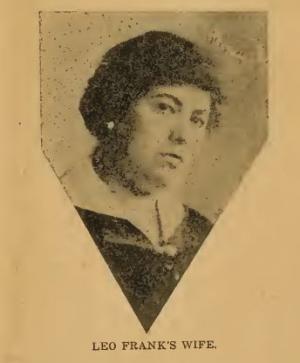
In his commutation of the sentence of Frank, the then Governor, Slaton, laid much stress upon Minola McKnight's affidavit, alleging, in effect, that it was entirely false.
You have a right to view that statement of the cook, in the light all the surrounding circumstances, and to say how much moral weight you will give to it—for you are not bound by technical rules, and you are entitled now, to know all that occurred.
In order that you may have a clear idea of this episode, it is necessary to remind you that Frank had hurried Mrs. White out of factory, at about 1 o'clock; that Conley had gone on to his home; that Frank went out to his, and that Albert McKnight swears Frank remained only a few minutes, ate nothing, and hurried back toward the city. Albert told this to the white men he worked with, at the Beck, Gregg Hardware Company, before his wife was arrested. It seems that this information, given by the cook's husband, was one of the first independent pointers to Frank as the guilty man—independent of the circumstances immediately surrounding the crime.
At the station house, the cook refused to talk to the detectives; but after these black sheep had been ignominiously sent away, the colored lady dried her eyes, composed her rumpled feelings, and spoke as follows:
"Mr. Frank came for dinner, about half-past one, but Mr. Frank did not eat any dinner, and left in about ten minutes after he got there.
"Mr. Frank came back to the house at seven o'clock that night.
"Sunday morning I got there about eight o'clock, and there was an automobile standing in front of the house, but I didn't pay any attention to it. (It was the automobile of the two police officers.)
"I called them down to breakfast about half-past eight, and I found out that Mr. Frank was gone. (The policemen had carried him with them in their car.)
"I did not hear them say anything at the breakfast table. After dinner, I understood them to say that Mr. Frank and a girl were caught at the office Saturday. I don't know who said it. Mrs. Frank, Mr. Selig, Mrs. Selig, and Mr. Frank were standing there talking, after dinner, when they said it. I understood them to say it was Jew girl."
This very remarkable statement of the cook would seem to prove two things; first, that she was not making up a tale, nor repeating one that her husband had made; and, second, that the family of Frank were bandying, to and fro, the words "Jew" and "Gentile," and the cook caught the word Jew, and got it wrong.
They were no doubt conversing in low tones, and the colored lady was probably listening at the key hole. The mysterious automobile, the unusual absence of Frank from Sunday breakfast, and the general stir in the family, could not have failed to arouse the colored lady's curiosity; hence her key-hole endeavors to acquire knowledge.
The cook proceeds: "On Tuesday, Mr. Frank says to me, ‘It's mighty bad, Minola; I might have to go to jail about this girl, and I don't know a thing about it.'"
If the cook's husband invented this, he is a most extraordinary inventor.
The cook proceeds: "Sunday, Miss Lucile (Mrs. Frank) said to Mrs. Selig (her mother), that Mr. Frank didn't rest so good Saturday night; she said he was drunk, and wouldn't let her sleep with him……She slept on a rug on the floor."
"Miss Lucile said Sunday that Mr. Frank told her Saturday night that he was in trouble, and that he didn't know the reason why he would murder, and told his wife to get his pistol, and let him kill himself."
Drinking so heavily that his young wife had to lie on the floor; tormented by recollection of what he had done; unable, now, to comprehend how he could have done that cruel, cruel murder; calling for his pistol, that he might end it all!
Such is the scene which rises before you, as you reflect upon the cook's story.
Invented? If so, whoever invented it should go to writing novels. A cook with that talent is hiding a big light under a small bushel.
The cook proceeds: "I haven't heard Miss Lucile say whether she believed it or not.
"I don't know why Mrs. Frank didn't come to see her husband (when he was in jail), but it was a pretty long time before she would come to see him, MAYBE TWO WEEKS."
(It was nearer three weeks, before Mrs. Frank would go to see her husband—a circumstance to which Frank's partisans never refer.)
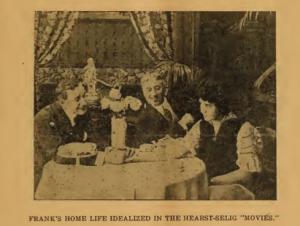
In her affidavit, the cook swears that the Seligs paid her money, and told her to be careful how she talked. Before the notary took her oath to her statements, she was asked:
"Has Mr. Pickett, or Mr. Craven, or Mr. Campbell, or myself, influenced you in any way, or threatened you in any way, to make this statement?"
Answer: "No, sir."
Question: "You make it of your own free will, and in the presence of your attorney, Mr. Gordon?"
Answer: "Yes, sir."
The cook signed her name, and took the oath, before G.C. February, Notary Public. The date was June 3rd, 1913.
I venture to say that every white man who has an intimate knowledge of the characteristics of negroes, will agree, that a negro cook, who had no grudge against her white folks, could never have been induced to fabricate such a tale as Minola told. It is too circumstantial. It gives away inside facts which no human brain could have invented. It bears the ear-marks of truth.
What negro would ever have drawn that gruesome night picture of the young wife, lying on a rug, on the floor; and the young husband, drinking himself into stupefaction, wildly, wondering how he came to murder; and calling for his pistol, that he might kill himself?
The appearance which this distraught young man presented to the police officers, next morning, was in exact accordance with his intoxicated condition the night before!
The evidence of the two white men, John Black and Woods Rogers, tallies precisely with that of the cook; and they had given their description of Frank's appearance and movements, Sunday morning, before they knew what the cook would swear, about his heavy drinking Saturday night.
It is one of the most striking corroborations in the case. The cook told the truth in the affidavit; and if she lives until Frank dies, she will tell more.
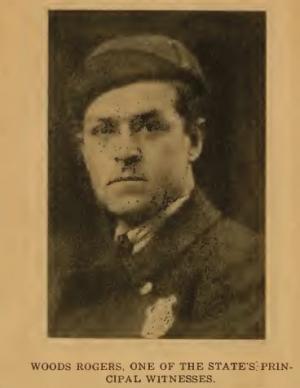
When the two officers went out to Frank's house, they had no suspicion of his guilt. They wanted him to see the girl, and if possible give them some clue to work on. They found him in the nervous, jerky, rickety state, natural to a man who had been drinking the night before. He asked whether anything had happened at the factory, and was told that Mary Phagan had been found dead in the basement.
He makes no outcry of amazement and horror! He expresses no surprise at the crime. He utters no word of pity for the victim. He offers no information to the policemen. He suggests no possible theory as to the criminal. He closes like a clam, shakes like an aspen, begs for a cup of coffee, refuses to look on the pallid face of the murdered girl, and denies that he knew Mary Phagan!
To this climax of the case, we come by a strong, continuous chain of evidence, furnished by white witnesses, not one of whom was impeached, or contradicted, and not one of whom was unfriendly to Frank, if we exclude the girls he had tried to ruin.
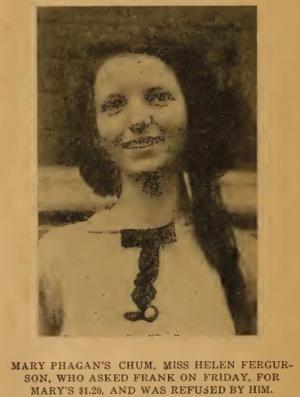
Consequently, it is impossible that you do not recognize in Leo Frank the man who had the lewd character needed in the criminal; the man who had shown a desire to possess this little girl; the man whose refusal to send her money, made it necessary for her to come for it; the man who had her in his possession and power at the time she disappears; the man—and the only man—whom she asked about the metal room, and therefore the man—and the only man—who could have led her back there and shut the door, without arousing her suspicion.
It is impossible for you not to recognize in Frank the only man who had the opportunity which the metal room afforded, when she asked the fatal question—"Has the new metal come?"
After he had accompanied the officers to the morgue, and to the factory, he returned home, and was there the remainder of the day, so far as the State knows. On Monday, he was at the factory, where of course excitement prevailed.
All that day, while Barrett and others were talking of the blood-spots, and the hair, and were casting about for clues, nobody mentioned Frank as the possible criminal. Nobody seems to have realized that he and Conley were the only two men who could have killed the girl. It is highly probable that none of them knew that the doctors, and the undertaker would testify that the body had been lifeless for so long a time, as to carry the murder back to near the noon hour Saturday.
These definite conclusions often ripen slowly—so slowly that we sometimes wonder at our own blindness in not seeing them at first glance. When the scientific evidence fixed the time of the crime somewhere near the noon hour, and the girl's stomach corroborated the doctors, the area of the investigation narrowed at once, the exact time that Monteen Stover was in Frank's vacant office.
Taking the time when Mary was seen going toward the building, and only two blocks distant, we are driven to the conclusion that she had entered and disappeared before Monteen arrived; and that she was in the metal room, unconscious, while Monteen was waiting in the vacant office.
Frank's partisans have to contend that Mary left him at that time, and went down stairs, on her way out.
If so, why was she not seen by Monteen Stover?
But they contend that Conley seized her as she reached the foot of the stairs.
Then, how came the blood, and the hair, up stairs, and not down stairs?
And would not Monteen, entering, have caught Conley in the act?
She would have caught Frank in the act, had it not been for the closed door of the metal room!
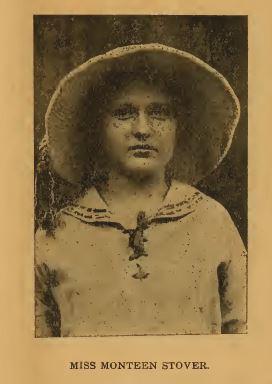
THE BLOOD ON THE FLOOR.
Pardon me for dwelling more at length on the blood, up stairs, on Frank's floor. What is the official record as to this blood?
J.N. Starnes testified:
"I saw splotches that looked like blood…some of which I chipped up. I should judge the area around those splotches was a foot and a half. It looked like a white substance had been swept over it. There is a lot of that white substance in the metal department."
R.P. Barrett swore positively, "It was blood!" The spots were not there Friday; the largest was "four or five inches in diameter, with little spots behind these from the rear, six or eight in number."
Mrs. George W. Jefferson was another worker in the metal department. She swore:
"We saw the blood, Monday. It was about as big as a fan, something white was over it.
"I didn't see the blood Friday. It was not paint."
N.V. Darley, manager of a branch of Frank's factory, testified:
"Mr. Quinn called my attention to the blood spots. Barrett called Quinn's attention to it. Barrett showed me some hair on a lever of the lathe.
"It looked like an attempt had been made to hide the (blood) spots. The white stuff practically hid the spots."
What made the spots, and who tried to hide them?
We narrow the investigation to Saturday, because three white witnesses swear the spots were not there Friday.
Harry Denham and Arthur White did not go to the metal room; and none of Frank's visitors did, on Saturday, if we leave out Mary Phagan.
If we except Leo Frank and Mary Phagan, we are absolutely unable to trace anybody to the metal room, on Saturday.
Then, if the blood, and the hair, prove that at least two persons were in the metal room, Saturday; and if the evidence excludes the possibility of those two persons being other than Frank and Mary; we are forced to the conclusion that these two went there; and, if one of the two died by violence, we can't escape the conviction that the other did the killing.
Of course, the State's theory is, that when Frank struck the girl, her fall, backward and downward, was broken by the metal crank-handle of Barrett's machine; and that his projecting shaft tore out some of her hair, and ripped her scalp to the bone, inflicting the wound which ranged "from down upward," producing unconsciousness.
No other explanation can be given of two wounds simultaneously given, one in the face and the other on the back of the head.
Governor Slaton declared that the body could not have reached the basement by the elevator.
What difference does it make?
The corpse was there; and no signs of a struggle, no signs of blood, no signs of torn-out hair, could be seen.
On the contrary, Sergeant Dobbs testified that he saw the trace of the dragging of the body; and this trace led from the elevator, to where he found the girl. Her face was scratched and soiled, in exactly the way it would have been, had she been dragged by the heels.
These surface abrasions of the skin were made after death, the doctors said; and there is no other way to account for them.
So far afield have gone some of the Hessian theorists that they have argued the crime itself into the basement, where Conley, they say, held the girl's nose in a bank of cinders until she was smothered! Yet here is the official record which shows that there was no accumulation of ashes or cinders in the basement, no ashes or cinders in the girl's nostrils or mouth; no ashes and cinders in her hands. The entire floor was just an ordinary dirt floor, gritty, of course, and with ashes and cinders sifted thinly on the surface, and trodden into the earth.
What more did the criminal need, than the cruel cord, tied around her neck in a running noose—a cord large enough, and strong enough to strangle a horse? I have had that horrible thing in my possession, and I know what powerful twine it is. You could tie and hold a steer with it.
As it was strangling the poor child, her tongue protruded from her mouth, half an inch—and there was no bruise, and no cinders on the tongue.
No rapist, or murderer, could hold a strong girl's face buried in ashes and cinders, and kill her that way, without leaving indelible marks in the ashes and cinders, and without leaving indelible marks on the girl's front face—and on her neck, where his ruthless fingers gripped and held her!
Is it not so?
Upon this girl's neck, was no sign of violence, save where the hemp cord buried itself in her flesh.
No crueler mortal was ever instigated of the Devil, than the monster who roped that child's tender throat, and gloated over her as she died!
How did her body get to the basement?
It does not matter; or if she went there while alive, neither Frank nor Conley could have carried her, without the other knowing it; and if she went there dead, both were necessary for the work.
There are only two ways of getting into the basement from the floor above: one is the elevator, and the other is the ladder. The foot of the ladder rests on the dirt floor, and it runs up to the hold covered by a trap door.
How large is this hole? It is two feet square. The witnesses said that one person, at a time, could pass through this hole in the floor, and descend the ladder, but that it was a difficult matter.
In other words, it was a tight squeeze for a grown man of average size to go down through this two-foot hole in the floor.
That being the size of the opening, and that being its location, you can readily see that it is an awkward, troublesome job for a full-grown person to go to the cellar in that way.
With the elevator, it is altogether different. To use it with ease, nothing more was need than to unlock the power-box—and it was found unlocked Sunday morning!
Consequently, whoever wanted to use it, Saturday, could do so; and the fact that it was found in usable condition Sunday, naturally inclines you to believe that it had been in use Saturday.
Is it not so?
At all events, there was the elevator in condition to be use, with no other labor and difficulty than to open the door, step in, and pull the cable; the car would do the rest. But, with the other way of reaching the basement, there was a trap door to be lifted, and a ladder (not stairs) to descend; and when you give to any man the task of carrying a corpse weighing 127 pounds down that ladder, you have assigned to him a labor not only most difficult, but decidedly dangerous. The slightest loss of balance would have tumbled him off the ladder, and imperiled his neck.
Between the easy-going elevator and this hard-going ladder, which does your intelligence choose? Why not take the elevator?
If my argument about the blood, and the hair, is sound, the elevator must be chosen, for you cannot suppose that the criminal toted the dying girl down stairs from the first floor. To have gone with her toward the front door, where a visitor was likely to enter any time, would have been sheer madness.
But the elevator afforded secrecy, celerity, and noiselessness; no one could see what was in it, and no one could hear it, for the two carpenters on the fourth floor were not only engaged in the noisiest work, but were 200 feet back from the elevator shaft.
Even if there was a risk in the easy, swift use of the elevator, it was infinitely less of a peril than to lift the corpse, and carry it down the stairway, and then get it through the trap-door, and down the ladder.
Why should we not do what a criminal in such a case would naturally do—follow the line of the least resistance, and adopt the safest, easiest, quickest method?
Governor Slaton did not cross-examine Leo Frank, or the accomplice, Jim Conley; but the Governor went to the factory, and travelled up and down in the elevator; and after having done so, declared that Mary Phagan's body could not have been taken to the basement by the elevator. Why not?
Because (as he says) on Saturday morning, a soft substance (excrement) had been deposited on the ground, in the shaft, and this excrement was found unmashed, Sunday. Wonderful Governor!
In the first place, the bottom of the shaft is uneven, and the elevator can rest upon the earth at one part, and not touch at others. In the second place, elevators do not always stop exactly at the bottom. In the third place, the elevator did not mash the excrement when the men first went down it, Sunday morning!
THE JEWS FIRST ACCUSED FRANK.
Let us go back to the Monday, following the Saturday of the crime.
The city of Atlanta was seething with excitement; the factory was in a hubbub; the detectives and the police were scouring the earth to find clues. Almost everybody suspected the night-watch to be the criminal. He was put under arrest, and he was manacled.
That's what the Gentiles did, at the instance of Leo Frank, who intimated his belief in Newt Lee's guilt.
What did the Jews do?
They pussy-footed to the strongest team of lawyers in Atlanta, and secretly employed them to defend Leo Frank!
Be it remembered, always, that the rich Jews of Frank's immediate family and business connection, were the first to accuse him of this hideous crime.
Before the Gentiles had said one word against him, or taken any action against him, his own people had done what was never done, anywhere, at any time:
They hired the most expensive lawyers, before there was a breath of Gentile accusation against this alleged martyr of "race hatred."
When you reflect upon this fact, your mind will connect it with the story which the cook told her husband. The Seligs (the parents-in-law of Frank), of course, knew how Frank had raved that Saturday night; their daughter would have been unnatural if she had not spoken of the horror which possessed her, when that drunken husband was wildly talking of the murder, and calling for his pistol.
As sure as God made the world, the Seligs communicated with the Montags, and the Haas brothers, that very day; (the police had got them on the telephone just after finding the corpse), and they pussy-footed to the law firm of Rosser & Brandon—a firm soon to be augmented by the Governor-elect, John M. Slaton.
(Keep this detail in mind.)
Consider the phenomenal situation!
There lies Mary Phagan at the morgue; there sits Newt Lee in jail, with handcuffs on; there go Barrett, Standford, Mrs. Fleming, and others, showing the blood, and the hair; there goes Jim Conley, about his work as usual, in the same clothes he wore last Saturday; there goes Leo Frank, who has changed HIS clothes, and who tells the police that he doesn't believe that the night-watch has told all he knows; and there goes somebody to plant a bloody shirt in the night-watchman's clothes barrel; and somebody fixes a time-slip which gives Lee time to have gone to his home during the night of the crime—and this is done after Frank had told the officers the time-slip was regularly punched; and it is Frank himself who, after the bloody shirt has been planted on Newt Lee's premises, urges the police to search those premises!
And during all that time, the best lawyers have been secretly engaged to defend Leo Frank—lawyers who will soon take into their firm the man whom the people had recently elected to be their Chief Magistrate!
When the detectives lose faith in the bloody shirt—there was no African odor on it, and the blood was too evidently a recent smear inside and out—Frank has another shot in the locker. He tells the officers that J.M. Gantt had been intimate with Mary Phagan, and hints that he had been too intimate. He also informs them of Gantt's visit to the factory, Saturday afternoon, to get two pairs of old shoes he had left there. Consequently, the excited police go and nab J.M. Gantt.
Thus the martyr of race hatred flings the meshes of suspicion around two innocent men, before he himself has been suspected by anybody, excepting the rich Jews who had swiftly, stealthily employed for the martyr the supposedly ablest lawyers in Georgia.
And so thoroughly uneasy are these rich Jews, that the Governor-elect is soon added to the Rosser firm—to the amazement of the political friends of John. M. Slaton.
To be exact, Rosser took the Governor-elect into his firm in May, 1913.
Mary Phagan was killed in April.
To fully comprehend the infamous betrayal of the State of Georgia, by Governor Slaton, you must keep in your mind the astounding fact that he joined Rosser's firm, after that firm had been employed to defend Frank, and had publicly taken part in his case.
If an angel from Heaven should swear, on a stack of Bibles, that Slaton's partnership with Frank's leading lawyers had nothing to do with his commutation of the sentence, you might possibly believe it.
A Governor cannot practice law openly; and in June, 1913, John M. Slaton was to be inaugurated for a term of two years.
Why, then, did he, in May, join a firm with which he could not openly act, until after June, 1915?
And why did Rosser, in May, 1913, take in a partner whom he could not openly use, during the next two years?
Mark this: On Monday, Jim Conley and Frank came and went; Lee and Gantt were in limbo; others were suspected, and temporarily detained; and still, not a word was said against the Jew. His battery of lawyers was masked; nobody knew such a battery had been positioned; his Montags laid low; his Seligs were equally discreet.
Suddenly, like a scene-shift on the stage, the officers turn to Leo Frank, and say, in substance, "We will have to interrogate you, Mr. Frank!"
Then, the legal battery unmasks. Frank refuses to answer any questions, until his Rosser comes!
Innocent? When did conscious innocence ever play the game with trump cards up its sleeve?
The crafty Frank knew from the first that the dogs would find his trail, sooner or later; and he had not only prepared for the struggle by retaining crack lawyers, but he had kept suspicion off Jim Conley, not even informing his detective, Harry Scott, that Conley could write.
Scott would not know the rudiments of his business, if he had not realized, early in his investigations, that if Frank was innocent, Conley was; and if Conley was guilty, Frank was.
The thing is plain enough: put Conley at the foot of the stairs, and Frank at the top, and the girl going up or down the stairs, it is impossible for one of the men to seize the girl and do what was done to her, without the other man knowing it.
The doors were open between Frank and Conley; the space separating them was inconsiderable; Conley could not strike the girl in the face, and knock her down, without Frank hearing it; whereas Frank could go with her back to the metal room, and close the door.
Because of the certainty that, if Conley committed the crime, Frank knew it, Harry Scott and the police officers made every effort to find the criminal, in somebody else. Only as a last resort, did they turn to Conley.
Reluctant to betray his boss, and to get himself in trouble, Conley denied all knowledge of the crime; and went to pouring out lies, in true negro style. But the conviction grew that only he and Frank could be implicated, because only they had had the opportunity.
Finally, the negro broke down, confessed, and asked to be taken to Frank, so that the two could be heard to talk the matter over.
And the innocent martyr, a graduate of Cornell, shrinks from meeting the ignorant negro, in the presence of witnesses.
Yes! The white man is afraid to face the black, who accuses him of the most heinous crime ever perpetrated in the South.
What was Frank's excuse for not facing the negro, and talking with him about how the little girl came to her death, in his place of business?
His excuse was, that Rosser was out of town. But Haas was not out of town, and Rosser's partners were accessible.
However, the innocent martyr dared not confront a guilty negro—a low-down, drunken brute, they call him—because Rosser was not present, to prevent the black brute from getting the better of the educated white gentleman who was President of the Atlanta B'nai B'rith.
And this is the same shrinking, cowering culprit who could not look at the dead girl's face, pretended not to know her, feared to ask the eleven white ladies why they swore he had a lascivious character, and hid himself behind his legal immunity from cross-examination!
This is the victim of mob spirit, and race hatred—this Jew whose rich kinsmen stealthily hastened to hire lawyers before any Gentile had accused him, and whose Jewish wife utterly refused to go to him for three weeks after his arrest!
There are some actions that speak like thunder claps; and the secret employment of those lawyers, together with the abhorring avoidance of Frank by his own wife, are just such actions.
How, in the name of God, can any sane man believe him innocent, after weighing those two stupendous facts?
THE JEWS closest to him, CONDEMNED HIM, before the Gentiles even suspected him!
It was not until the 29th of April that Frank was detained at police headquarters, to await the action of the Coroner's Jury. After a careful investigation of the case, Frank and Newt Lee were both held. Frank had testified at length under oath, and not one word of suspicion had he dropped on Jim Conley. He did not tell the Coroner that Conley was in the factory on Saturday, nor did he disclose the fact that Conley could write.
He did not utter a word that would clear Newt Lee, and give to that innocent darkey his freedom.
He was perfectly content to screen Jim Conley, and to see the halter close upon the neck of Lee!
On May 24th, Frank was indicted by twenty-three grand-jurors, four of whom were Jews. (Not one of those official accusers has ever asked that Frank's sentence of death be commuted.)
On July 28th, 1913, Frank's trial commenced, before Judge L.S. Roan, and a jury, selected jointly by the State and the accused.
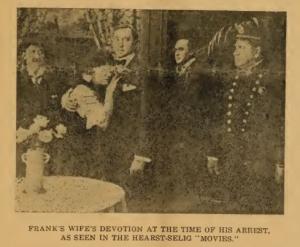
Until August 20th, the Court was hearing the evidence, and on that day the attorneys began their speeches. Fiver days later, the case went to the jury, and on the same day, a verdict of "Guilty" was returned, without recommendation to mercy. On the next day, Judge Roan sentenced Frank to be hanged on October 10, 1913. His attorneys moved for a new trial, which Judge Roan refused; and the case was appealed to the Supreme Court, which affirmed the Court below.
The Supreme Court reviewed all of the evidence, at great length, and decided that it was sufficient to sustain the verdict. This decision appears in the 141st volume of Georgia Reports, and speaks for itself.
Four of the six Justices held that the trial of Frank had been perfectly fair, and that he had been properly convicted. Two of the Justices differed; and held that Judge Roan should not have permitted Conley, and several white witnesses, to testify to the independent acts of immorality, on the part of Frank.
The decision, as published, shows that this was the only question upon which our Supreme Court divided; and you can see that it was a point of minor importance. The real issue in the case was, whether Leo Frank murdered Mary Phagan, for the indictment did not charge him with rape.
Consequently, Justices Fish and Beck went off on a spur track, and did not jump the rails on the main line.
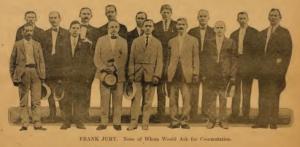
No matter how immoral the jury believed Frank to be, they were too intelligent to convict him of murder, on evidence of sexual vices.
It is well for you to know what the Supreme Court divided on; because the public has had the fact of the divided court dinned into its ears, for more than a year, without having been told the comparative insignificance of the division.
Neither has the public been told that when Frank's lawyers took the division of the Justices too seriously, and demanded a re-hearing of the case, the Supreme Court unanimously refused it. This of itself proves that the dissenting opinions of Justices Fish and Beck left no deep impression even on their own minds.
THE SUPREME COURT REVIEWED THE EVIDENCE.
With an effrontery hard to comprehend and sufficiently condemn, it has been stated, again and again, that the State of Georgia has no court that can review the evidence in a criminal case! Every volume of our Supreme Court decisions (Georgia Reports) proves the audacity and shamelessness of the falsehood, first published by C.P. Connolly, and finally by the Governor who commuted the sentence. So far is the statement from being true, that in practically every motion for a new trial, there are three stereotyped grounds which are argued before the Supreme Court; to wit, that the verdict is against the evidence, that the verdict is against the weight of the evidence, and that the verdict is unsupported by the evidence. While, of course, these three stereotyped grounds are really but one, the fact that they are almost always made, and passed on by the Supreme Court, shows that this highest of State tribunals is constantly reviewing the evidence—weighing it, measuring it—and deciding whether it shows the defendant's guilt beyond a reasonable doubt.
If, in the opinion of the Court, the evidence fails to do this, the judge below is reversed, and a new trial ordered.
When C.P. Connolly stated in Collier's, that the Supreme Court of Georgia had no such power as this, it was possible to explain his mendacity upon the assumption of his ignorance; but when Governor John M. Slaton used almost the same words, in saving the neck of his guilty client, no such excuse can be made for him. He lied, with deliberation and moral turpitude.
On page 247, of the 141st Volume Georgia Reports, you may read the 20th head-note of the Supreme Court's decision in the Frank case:
"20. The evidence supports the verdict, and there was no abuse of discretion in refusing a new trial."
In the body of the decision, page 284, you may find these words:
"20. The record is voluminous….We have given careful consideration to the evidence, and we believe the same to be sufficient to uphold the verdict, and as no substantial error was committed in the trial of the case, the discretion of the Court in refusing a new trial will not be disturbed."
In two other cases, reported in this same volume, the Supreme Court was asked to review the evidence against the defendant, and to decide whether it showed guilt beyond a reasonable doubt. The cases are those of Brown, and Hart, both murder cases; and the Court held that the evidence must demonstrate the guilt of defendants beyond a reasonable doubt. That is a maxim, a standing rule, an invariable principle with our Supreme Court; and every Georgia lawyers knows it.
ENTER, BURNS!
The decision of our highest court was supposed to settle the Frank case.
Such a decision has always been taken as final, except in extraordinary cases, where new evidence developed after the trial—evidence which might have caused a different verdict, and which could not have been discovered before the trial, by the use of diligent methods.
Here it was that Burns came roaring into the case, airily assuming that it had never been tried. Burns blotted out the trial judge, the jury, and the Supreme Court. Burns made a calliope of himself, and every resounding note he struck echoed deafeningly through the Atlanta dailies, and through the Northern papers owned by the Jews, and by William Randolph Hearst. Burns ostentatiously visited the pencil factory, just as though he had recently discovered its whereabouts; and he sleuthed over the premises with unearthly skill and subtlety, just as though the crime had been committed the day before. After running up and down the stairs; and poking his nose first in one room, and then in another; and travelling back and forth in the elevator; and cannily boring holes into everybody with his all-knowing eyes, Burns came forth to the reporters and yelled into their eager ears the startling discovery he had made!
He had discovered—the blatant ass had actually discovered, that the crime was the work of a pervert of the lowest type, and this pervert was a man that no one had even suspected! He, Burns, meant to locate that unsuspected man, demonstrate his guilt, and overwhelm the Pinkerton Detective Agency, and the Atlanta police. He, Burns, was "utterly confident," he would lay his hands on this unsuspected pervert, and, by proving his guilt—Burns felt sure he would confess—he would show what boobies the Pinkertons, and Atlanta police, had been, when they arrested Newt Lee, J.M. Gantt, Jim Conley, and Leo Frank.
Never in my life, have I known any man to make as much noise as Burns made; and never have I known the daily papers turn themselves into sounding boards, fog-horns, and megaphones for anybody, as willingly as they did for this empty, vociferous, and pestilent scoundrel, William J. Burns.
There is just this much to be said to the credit of this intelligence: he then saw the same thing that Harry Scott had seen; to wit, he couldn't implicate Jim Conley (at the foot of the stairs) without implicating the white man, at the head of the stairs. Burns saw what any sane man ought to have seen, that the crime could not steer clear of both the white man and the negro, when they were so close together, and each knew of the other's presence, and each knew of the presence of the girl.
If she left Frank, she went to Jim, almost in Frank's presence; if she did not go to Jim, she never left Frank!
Even an asinine pseudo-detective, like Burns, could see that.
The only people who do not see it, belong to the class who, having eyes, see not.
Burns knew that Frank—if innocent—would have said, at the very beginning:
"The girl must have been assaulted and killed, almost immediately after she left my office; and as nobody but Jim was at the foot of the stairs, Jim did it. Go and nab Jim! Don't bother with Newt Lee! Don't arrest J.M. Gantt! Don't search Lee's premises for a blood-stained garment.
"Seize Jim! Search his premises. Jail the woman he lives with. Question them, separately. Compel Jim to tell what became of Mary, after Mary left my office, for she never reached the door; she was stunned, assaulted, and strangled inside my place; Jim and I were the only men in the house who could have known the girl was there, and who could have made the attack on her; and, as I did not do it, JIM DID!"
Oh, gentlemen, gentlemen! use your common sense! Isn't that what you would have said, had you been where Frank was, and none of that little maiden's blood reddened your hands?
What's the use of publishing falsehoods about Georgia laws, Georgia courts, and Georgia people, when one of our children lies in her untimely grave, and the record-evidence so plainly proves the infernal guilt of the man whom Rosser's partner, John M. Slaton, rescued from Biblical punishment?
Burns knew that had Frank been innocent, he would have put Harry Scott, and the other officers, on the trail of Jim Conley, instead of Newt Lee; and Frank would have told the detectives that he recognized Conley's writing in those notes; and that it was Conley who must have grabbed the girl as she reached the bottom of the stairs!
Burns isn't altogether a nin-com-poop; and he therefore knew that the screening of Jim Conley by Leo Frank, meant exactly the same as the screening of Leo Frank by Jim Conley, to wit—that they were both guilty.
Consequently, Burns went roaring into the North to find his pervert "who is still at large."
There is evidence in the record which shows that Burns tried to make a dummy out of a Chicago darkey named Allen. It appears that Burns pretended to be mysteriously turning the earth over, in Cincinnati. From time to time, Burns vigorously smiled, upon mankind, and fog-horned the information that he was making "most gratifying progress" in his sleuthing after that elusive pervert who had never been suspected.
We were told that Burns was compiling a mighty document, as he went along, and this dynamic document—as he vociferously shouted—would clear Leo Frank.
Naturally, Burns got on our nerves. He stayed there. We became obsessed with Burns. He agitated our reflections, disturbed our digestions, and monopolized our dreams. I never saw anything like it. The expense account of the Haas Finance Committee would, in my judgment, be more interesting than any human document that could be found this side of Jerusalem.
But all things must have an end; and even the Burns peregrinations and vociferations had to reach their final show-down; and when Burns' famous report came into view, it was nothing in the world but another argument—and a sorry one—on the evidence in the record!
Whichever way he turned, Burns ran against an impassible wall. It was the resource of desperation, when they fixed upon Conley as the only criminal; they did not do it, until there was nothing else to do! And they could never have "got away with it," if Rosser had not had a partner in the executive office.
WHAT ABOUT THE MOB?
In his very long, and very incoherent defense of himself, Governor Slaton urged the importance of what he called some newly-discovered evidence. That trumped up stuff was made on the basis of an extraordinary motion for a new trial; and when Judge Benj. H. Hill overruled it, the case again went to our Supreme Court, which unanimously decided against the defendant.
Not until he had twice gone to the highest State court, with nearly 200 different assignments of error, did Frank raise the point that he was not present, in person, when his lawyers waived his appearance, and received the verdict.
Judge Roan knew of the intense, but repressed feeling in Atlanta; and he feared that this feeling might escape control, if the defendant was acquitted. Suffering from the cancer which took his life not long afterwards, and worn down by the terrific strain of the trial, Judge Roan was naturally nervous, and apprehensive. But, as a matter of record, it was proved that he had nothing tangible to base his anxiety upon, for the Sheriff—who has, for cause, been Frank's champion—testified that there had never been any disturbance, no mob, no mob threats, &c.—and a score of deputies and other citizens swore to the same thing.
No evidence to the contrary could be obtained.
Remember, in this connection, that ex-Governor Brown, in his statement to Governor Slaton, said that certain gentlemen had brought him vague rumors of an intended mob; and that on the strength of these vague rumors, he had requested that some of the officers and soldiers of the National Guard sleep at the armory that night.
Ex-Governor Brown further stated that he caused the Mayor to have the city scouted, in automobiles, and that there was absolutely no sign of any mob, anywhere. Not as many as three men could be found bunched together.
Therefore, all the wild talk about mobs, and the holding of the military in readiness, frittered away into "vague rumors," which led the Governor to request that a few soldiers sleep where they could act quickly, if needed.
The lawyers of Frank made out a narrative of mob demonstrations, and mob pressure, drawing upon their imagination with prolific liberality. They carried this before Judge William Newman, of the Federal Court, on a writ of habeas corpus, which took the defendant out of the custody of the State. Losing before the Atlanta Judge, the lawyers persisted, until they got the case before the Supreme Court of the United States.
On April 19th, 1915, a decision was rendered against Frank, seven of the Justices holding that all the alleged facts as to mob violence had been carried before the Supreme Court of Georgia, and had been considered by that court "at times and places, and under circumstances wholly apart from the atmosphere of the trial, and free from any suggestion of mob domination, or the like; and the facts were examined, not only upon the affidavits and exhibits submitted in behalf of the prisoner…but also upon the rebutting affidavits submitted in behalf of the State, and which, for reasons not explained, he has not included in his petition."
The seven Justices, therefore, held that as Frank's lawyers had failed to include in their pleadings the evidence upon which Judge Hill, and our Supreme Court had based their decisions, the United States Supreme Court must assume that the Georgia courts had reached a righteous decision on the question of mob violence.
The seven Justices of the United States Supreme Court evidently suspected that the counter-showing, as to the existence of the alleged mob violence at the trial, must be conclusive, else Frank's attorneys would not have been afraid to let the Court, and the country, see how crushingly the State replied to those belated and manufactured charges.
The seven Justices cited numerous cases, in which our Supreme Court had granted new trials because of mob violence; and one of these was that Will Myers, THE JEW, who brutally murdered Crowley, near Atlanta, and who made a suspicious escape from the jail. If alive, he is yet roaming the earth, a free man—in consequence of the extreme jealously of Georgia's highest court in seeing to it, that even the guiltiest wretch shall be given a fair trial.
But it is said that two Justices of the United States Supreme Court dissented. So they did—but upon what?
Justices Holmes, speaking for himself and Justice Hughes, took the entire statement of Frank's lawyers as true—prima facie—and taking it to be the truth, those members of the Court held—
"Upon allegations of this gravity, it (Frank's petition) ought to be heard," by the Federal Courts, although it had already been heard and decided by the State Courts. Justices Holmes and Hughes held that it was proper to decide against the State, without seeing the State's side of the case; and to treat as null and void a State-Court decision, because of an ex-parte attack upon it!
I don't think many good lawyers will accept that as good law; and such a principle certainly antagonizes all previous decisions. The seven Justices merely followed precedent; to have ordered the re-trial, in the Federal Courts, of an issue of fact, which the State Courts had already tried, and decided adversely to the defendant, would have been revolutionary.
But it is sufficient to remind the unprofessional reader, that Justices Hughes and Holmes went no further than to decide that, taking the allegations of mob violence to be true, Frank had a right to be heard on that point. And the professional, as well as the unprofessional reader will be surprised to learn, that Frank had been fully heard on that very point—and that the record shows that there wasn't a particle of merit in the point. Why? Because there was no evidence to support it.
THE FACTS ABOUT CONLEY.
You will have noticed that I have discussed the case, upon the testimony of the unimpeached white witnesses, without using Jim Conley at all.
Let us now consider the negro, who has been so widely and violently assailed by the Frank partisans.
What are the facts as shown in this official record? They are, that Conley has been continually at work for white men, in Atlanta, and that he never had any trouble with any white person; nor was he ever a convict, except for thirty days, when he was sentenced in the police court for fighting another negro. In 1904, Jim had a row with a darkey, and was fined $1.75, which he paid. In 1905, he paid the same fine, for the same luxury. In 1906, they raised the price on him, and fined him $3.75, which he paid. In 1907, he had two fusses, and paid $26 for the brace. Finally, in 1912, he was given a sentence of thirty days.
At that time, he was in the employ of Leo Frank.
There is no evidence that he had ever been accused of violating a State law, much less convicted of any crime. The record shows that Conley had been a steady, regular worker at the pencil factory, for two years; and, in that length of time, Frank and his associates had found no serious fault with the negro. He was accused of borrowing nickels and dimes, which he was slow to repay; and one gentleman who had occasion to send Jim for a pot of beer, swore he wouldn't believe Jim on oath: "I have had no confidence in him since he put water in my beer." So, you see, there is really nothing of importance that they could prove against the negro, and you may be sure they left no stone unturned. Then, what is the gist of this evidence?
It is, that he saw two girls go up stairs, and only one come down; Mary went first, and Monteen followed; and Monteen remained up stairs quite a little bit, and then came back down and went away; and that he had already heard steps like two persons walking back to the metal room, just before Monteen came in; and that, after Monteen left, some one came running to the front up stairs on tip-toes; and then he heard the "stomp" that Frank always made when he was signaling Jim about a woman; and that he answered the signal, and found Frank near the head of the stairs, looking wild and excited; and that Frank asked him if he had seen a girl come up stairs, and Jim answered, "I seed two go up, but I ain't seen but one come down."
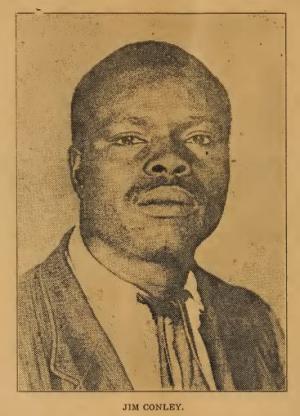
Then Frank told him that he had tried Mary in the metal room, and that she had resisted, and he had struck her, and "I guess I hit her too hard;" and that she had struck something and fell.
Frank told the negro he must help get the body to the basement; and the negro went to where the girl was lying on her back, with hands and arms up.
Frank had torn a strip form her underclothing, had folded it, and had placed it under her head—and that blood-clotted piece of undergarment had its tremendous weight with the jury, for it accounted for there being no blood on the floor beneath the hair on the lever she had struck in falling.
Jim picked up the body, carried it a few steps, and dropped it, near the dressing room, and the blood spattered, as her head again hit the floor.
Frank had to help Jim with the body, and they carried it to the elevator, the key of which Frank hurried to his office and got. They took her to the basement, and left her right there by the elevator, from which Sergeant Dobbs afterwards saw the signs of dragging commence.
Frank was so excited, that he ran up the ladder, telling Jim he would catch the elevator as it passed him on the floor above. This he did.
Then they were in Frank's office, and Frank talked excitedly, ramblingly, and, all at once, exclaimed—
"Why should I hang? I have rich people in Brooklyn!"
(At that time, and at the time Jim told the police of this, the negro did not know that Frank had any wealthy kinspeople anywhere.)
Then Frank asked Jim to write the notes, and the negro wrote four, two of which seemed to suit Frank; and he put them all in his desk. He gave Jim money, but took it back, saying he would attend to that later. He outlined a scheme by which the negro was to take the crime upon himself, promising to get him out on bond, and spirit him away. He made Jim promise to return that afternoon, and help him to dispose of Mary's body. Then they left the building, Jim going for a drink of beer in a near-by saloon, and then walking homeward with Ivie Jones. At home, Jim got to thinking about what had happened, and he was afraid to go back to the factory. Nor was he there Sunday, but he turned up as usual Monday morning.
In the two notes found lying beside the dead girl, she was made to tell her mother who it was that attacked her, and to explain how her body got to the basement. She said that as she went to the toilet (Frank's floor toilet!) the night watchman seized her, and flung her down the scuttle-hole. Notice the wild confusion which raged in the mind of the real author of the notes! He puts the place of the deadly assault right where it occurred; but postpones the time of the crime until night, when Newt Lee will be on duty. He doesn't realize the difficulty of explaining how Mary was kept in the building, from about noon until dark; but he does realize that he must try to account for the corpse being in a place the girl had never entered.
So, in one breath, he put the girl at the toilet, near the blood and the hair; and in the next, he has her flung down the ladder, into the basement, where no blood and no hair could be found!
Now, if you can believe the blood and the hair made their way perversely from the basement to near the toilet, to which, as Frank told the jury, he might have gone unconsciously, you may also believe that a negro, having committed the crime, seated himself by the corpse, in a dark cellar, to write notes of explanation to the girl's mother.
Robust animals, like Conley, do not commit the crime of Sodom: that is the vice of the degenerate, and Leo Frank's face looks the part to perfection!
Consequently, such a robust and natural negro as Conley, would be almost the last man you could imagine as the author of the notes in which unnatural intercourse with that little white girl is suggested.
Now, let us put our mother-wit to the work on this negro witness.
When the record discloses that he had worked two years for Leo Frank, we must assume that a certain intimacy and confidence had been established between the two.
When we learn from disinterested white witnesses, that Frank had had women of the town to visit the factory, during business hours, and on Saturday afternoons, we are bound to believe that the negro knew of it, because his place was near the front entrance.
Wouldn't Frank, who was afraid of his Uncle Montag, want someone to keep a watch-out for him, when these lewd women darted in and out? Naturally. Then, who would serve his purpose better than this submissive negro?
But, let us come directly to the question which goes to the bowels of the matter:
What evidence did the State have on Jim Conley, when he at length broke down, and confessed?
The State had none—absolutely none—except that three outsiders had seen a negro, whom they did not know, occupying a seat where Jim usually sat.
In other words, the State had no more evidence against Jim than it had against Frank, to wit—that he was in the factory on Saturday.
Therefore, when the negro confessed, he gave evidence which the State had been unable to get; and, if he had kept his mouth shut, Newt Lee might have suffered. After all, the dead body was found where Lee alone had been, for nine-and-a-half hours; and the forged time-slip did show a gap of an hour, and his clothes-barrel did hold a blood-stained shirt which might be his. Therefore, excited minds might suspect his guilt—especially if the person who planted that shirt would also swear he saw Mary Phagan on the streets, Saturday afternoon.
That Frank, and his partisans were dead-set against the innocent Newt Lee, is shown by their desperate effort to prove, by a prostitute, that she passed the pencil factory Saturday afternoon, and heard a woman's scream!
Remember, that all of this horrible work against an innocent negro, was in full progress, at the time Conley made his confession.
In other words, Newt Lee (accused in the notes) was being "framed up," by Frank and his lawyers, when Conley blocked the hideous scheme by his confession.
Remember, also, that Haas, the lawyer, and Montag, the principal owner of the factory, had both been told over the telephone, by the police, of the same finding of the corpse—told at the same time that the policemen were persistently trying to get Frank, on the telephone. They could hear the phone buzz and ring at the other end, but no response came from Frank's house.
Now, another thing: Suppose the undenied facts are inconsistent with the theory that any negro committed the crime!
Did any black assailant of a white woman ever go looking for a cord with which to strangle her, when his fingers were already on her throat? Never!
Did any black assailant of a white woman ever choke her to death, and then reverently fold her hands across her breast? Never!
Did a black rapist, and murderer of a white girl ever seat himself near her, to write four notes to her mother? Never!
Did such a negro criminal ever return to the scene of his crime, and go about his work as usual? Never!
Then, the conclusion which fixes itself in your mind is, that whoever used the cord was not a negro; and whoever folded those pulseless hands across the child's bosom, and wrote the notes to her mother, was not the principal perpetrator of the crime; and if the negro afterwards came and went about the premises, as if nothing had occurred, he did not assault the girl.
Let us view it from another standpoint:
If there are undisputed facts in the case which cannot be explained outside of Jim Conley's testimony, are we not safe in taking his evidence to that extent?
The undisputed facts which cannot be cleared up, without the aid of the negro's story, are these:
1. There was no blood on the floor under the bench-lathe, where the hair was found;
2. There was blood, a few steps distant, in the next room;
3. There was a cloth, stained with blood, hanging loosely around the girl's neck;
4. Her hands were decently crossed upon her bosom, and so rigidly fastened there, that they did not fall apart, when the corpse was dragged by the heels, 125 feet over a dirt floor which scarified her face.
The negro told the jury how he found Mary's body, with a piece of cloth under her head, "like to catch the blood." The jury saw the cloth, and the jury knew that no black man ever killed anybody, and then folded a strip of cloth, torn from the dress, to catch the blood. If not used to soak up the blood, why was the cloth loosely tied around the head?
The negro explained how he dropped the heavy corpse, in passing the dressing room, and thus spattered the floor with blood.
The negro told the jury, quite simply, and without knowing the vast psychological value of his statement, that he "put her hands down," and folded them across her bosom. Did any man ever do that, for any victim of his lust? Never in God's world!
Now, when you consult the evidence of other witnesses, and find that the girl's arms remained in that position, as she was being dragged on her face, your intelligence drives you to the conclusion, that her arms became rigid, in that position, long before she was dragged.
Then, you are pushed back to the story the negro told—the story of Frank's calling to him for help; the cloth under the bleeding head; the carrying of the corpse to the elevator; the leaving of it, on its back, in front of the elevator shaft, with the arms crossed as Jim had put them, up stairs.
Take Jim's story, and every kink untangles, every crease smoothes out; reject it, and there are undisputed facts in the record which no human ingenuity can explain.
Isn't this itself a most powerful corroboration of Jim's evidence?
Given essential facts which imperatively call for explanation, and which nobody can explain without the negro's help—what follows?
As sane people, we must accept the negro, to that extent.
If we accept him as to those unexplained, and otherwise unexplainable facts, we need not bother our heads about other details of his evidence: we have enough to understand the crime, and to identify the criminal.
And when you remember that one of these two men, Frank and Conley, successfully withstood a cross-examination of eight hours, while the other refused to be cross-examined at all, your mind gravitates to the story of the man who was vainly assailed by the prolonged cross-examination.
No suspicious tactics had to be used in behalf of Jim Conley. No cook swore against him, in the presence of her attorney, and then took it back. No prostitute had to be spirited away from Atlanta on his account. No poor old preacher was paid $200 to make a false affidavit for him; and nobody acting in his behalf endeavored to bribe, and to intimidate the State's witnesses.
During the entire two years that have passed since Conley confessed, not a single bit of evidence has been discovered against him, other than that which he voluntarily gave against himself.
And during that whole period, the hirelings of Big Money have never been able to unearth a scintilla of testimony in favor of Leo Frank.
Circumstantial evidence is sufficient to convict, when a crime is proved, and all other possible persons are excluded, save the prisoner at the bar.
In this case, the guilt of Frank can be shown on two lines, independent of each other. The negro's corroboration testimony does it; and the circumstantial evidence, without the negro, does it.
The twenty-three grand jurors thought so, and never changed their opinion. The twelve trial jurors thought so, and never changed their opinion. Judge Roan at least thought, the jury was justified in its opinion, for he refused to disturb the verdict; and he never told anybody, or wrote anybody to the contrary. And the Supreme Court thought the same way, for it sustained both the judge and the jury.
HOW CAME OTHER STATES TO INTERFERE?
Never before did we have outside influences brought to bear upon us, in our enforcement of law. We have tried Jews and Gentiles; rich men and poor men; white men and negroes; and we have put many a man to death, after precisely the same sort of procedure that was had in Frank's case.
Why was Frank made an exception? Why was he singled out for a national crusade against the State of Georgia? Why did New York preachers, and laymen get excited in behalf of this particular convict? Why did Chicago people turn their backs upon all the condemned murderers of the West, and come Pullman-carring down to Atlanta for Leo Frank? When, before, did governors, and legislatures of other States assume that they knew more bout our business than we ourselves knew? When, before, did the Jew papers, the L. & N. Railroad papers, and the Hearst papers arrogate to themselves the right to treat a carefully adjudicated case, as if it had never been legally decided?
(The Louisville & Nashville Railroad belongs to the Rothschilds, of whom the New York Jew, August Belmont, is the American agent. It was the baleful influence of this L. & N. system that debauched Kentucky and Tennessee politics, caused the assassination of Geobel and Carmack, and is now the power behind the throne in Georgia.)
What is to become of Law and Order, in any State, when outsiders claim the right to dictate to it?
After this case had gone the way of all others, the rich Jews formed a Finance Committee, headed by Haas of Atlanta. Contributions were poured into its treasury; and even the Jewish clerks were assessed on their wages. The Burns Detective Agency spent money like water—its own money, of course; and, in every direction, lawyers, politicians, and hack-writers were enlisted. Frank belonged to the Jewish aristocracy, and it was determined by the rich Jews that no aristocrat of their race should die for the death of a working-class Gentile—"nothing but a factory girl."
The most outrageous misrepresentations were published broadcast throughout the country; and as none of the Atlanta dailies would allow anybody to defend the State, the repeated and undenied accusations were believed by millions of people whose common sense should have suggested to them that, no Southern jury has ever convicted a white man on the sole evidence of a negro.
THEY DARED NOT PUBLISH THE RECORD.
The reason why sentiment in Georgia crystallized against Frank was, that I laid before the people the plain facts as they are preserved in the official record; and the reason why so many honest people in other States have misunderstood the case, and misjudged our Courts is, that the partisan pamphlets were believed to contain the truth.
If the record had agreed with the pamphlets, what was the need of so many pamphlets?
If the record failed to disclose any convincing evidence of Frank's guilt, why was it never published?
There is but one reply:
The record does show the man's guilt, and hence they could not print it.
You may be asked, Why did not the State publish the Brief of Evidence? In the first place, the Governor was a member of the law-firm which was getting the biggest fee for saving Frank's life. But, in any event, it is not to be expected that a sovereign State will appear as defendant at the bar of public opinion when arraigned by a Haas Finance Committee, a rotten Detective Agency, a regiment of feed lawyers, and a pack of nondescript publicists.
A sovereign State may well maintain a dignified silence, conscious of the rectitude of her judicial proceedings, and trusting to the imperishable official record to vindicate her from unofficial and irresponsible assailants.
From the Pittsburg Leader, I extract the following, as a fair sample of the editorials in behalf of Frank:
Few individual cases have attracted the attention and drawn the sympathy of the country as that of Leo Frank, under sentence of death in Georgia. No case has become so celebrated for the same reason—that a man was convicted in advance of his trial, and that the trial itself was a travesty.
The country has been convinced that Frank is a victim of extraordinary prejudice. It takes unusual prejudice to make a man's life the price of his payment. This is a point which has remained hidden in all the reviews of the case since his conviction.
In all the proceedings that have been taken by Frank's attorneys, and in all the reviews of the case, the evidence upon which he has been sentenced to death has not once been touched.
Technical points have been passed upon, but not once before any court was the question of evidence discussed.
The various courts took up and passed upon every other point but the one most vital to Frank—that the evidence to convict was lacking.
If you have paid any attention to what I have already written, you know how shamefully false was the statement made in the Leader.
The editorial continues:
Except in one little spot in Georgia, Leo Frank is looked upon as a victim of prejudice, mob law, and perversion of the legal machinery.
Governor Slaton has taken up the application for executive clemency, and promises to virtually re-try the case. He has become impressed by the nation-wide, human protest against Frank's martyrdom, no less than the seriousness of the charges against the name of his State.
The Governor is receiving an endless string of letters from men and women all over the country asking him to either pardon or commute the sentence; so he may have a chance to establish his innocence later.
The individual letters to Governor Slaton have been strengthened by chain letters which are rolling across the country. Letter chains have been formed everywhere, and are moving like an avalanche toward the Governor's office in Georgia.
No better cause than this, the life of a man condemned to die, branded as a criminal because a mob demanded blood, ever enlisted the energies and sympathy of the American people.
The only hope for Frank is that the public's attitude make enough impression upon Governor Slaton to convince him that the case should be re-tried or its victim set free.
Governor Slaton is intensely interested from the first, and never defended, even by the Georgia mob, that there was no evidence to convict any man except one picked out for an application of legal lynch law.
Let every humane man and woman in American write a letter to Governor Slaton. Make up chain letters to convince him that the guilt of Leo Frank is accepted only by a handful of men in one town in Georgia who want his life in a spirit of blood-lust prejudice.
Write today, and tomorrow, and every day until Frank is pardoned, his sentence commuted or he goes to death, lynched by a Georgia mob.
Write today.
In addition to these chain-letters, men were hired to stand at car-stations, in Chicago, and other cities, to enroll the name of every passer-by who would sign a petition; similar petitions were carried from house to house, store to store, office to office, until even the school children of other States were telling us how to manage our affairs.
ENTER HEARST AND HIS SHEARN.
Perhaps the most astounding piece of impudence was that of William Randolph Hearst—partner of Frank's people in the moving picture business.
He sent to Georgia his personal attorney, Clarence Shearn (of Jerusalem), who happens to be—by the grace of Hearst—a member of the Supreme Court of the State of New York.
When William Randolph Hearst whistled for his little Supreme Court Judge, Shearn should have begged permission to remind his master, that although he had responded to his master's voice, it would not look well for one member of the Supreme Court of New York to invade a friendly State, review a decision of her Supreme Court, and overrule it—without notice to that august tribunal, and without allowing it to be heard in its own defense.
However, this is what Shearn actually did, as related proudly, by himself:
New York, June 10, 1915.
Dear Mr. Hearst:
I went to Atlanta, as requested by you, for the purpose of making a careful examination into the case of Leo Frank, from the impartial standpoint of a lawyer who previously knew nothing about the facts of the case. Supplementing my full oral report to you, I state herewith, for the purpose of future reference the result of my investigation.
In order to arrive at a conclusion based solely upon the evidence, and before discussing the case with any person, I read the printed record containing the evidence introduced upon Frank's trial, and the argument to the jury made by State Solicitor Dorsey; I also read the State's brief on appeal, so as to be fully apprised of everything that the State claimed to have established against Frank.
My deliberate judgment, based solely upon the record, and formed as a judge would reach a conclusion in passing upon it on appeal, is that not only did the prosecution fail to prove Frank to be guilty beyond a reasonable doubt, but that, outside of the incredible and interested testimony of the suspected negro, Conley, an admitted accomplice, there is no legal evidence whatever in the case upon which even a reasonable hypothesis of Frank's guilt may be based. The irresistible conclusion to be reached on the evidence in the record is not only that Frank is innocent, but that the negro is guilty.
After this examination of the record I interviewed and cross-examined Frank in the penitentiary for an hour or more. I then visited the factory where the crime was committed, and carefully examined all parts of the premises involved in the crime which were mentioned or referred to in the testimony. This resulted in confirming the conclusion that I had reached on reading the record.
Yours sincerely,
CLARENCE J. SHEARN.
It is safe to say that no State in the Union, and no independent kingdom in the world, was ever before subjected to such an indignity. It is on a small scale, but it is a gross indignity, nevertheless.
Austria demanded of Servia the right to send her judges to try the Servian assassin of the Archduke Ferdinand, and Servia's refusal precipitated the European war. Arguing from example, Hearst and Shearn believe that Servia should have granted Austria's demand!
Shearn's opinion bears the same date as Hearst's private appeal to Governor Slaton, which appeal was not published in Georgia at all, and was not given out in the North and West until June 23rd, three days after the sentence was commuted. In that private appeal, Mr. Hearst says:
Frank was convicted on the testimony of the negro Conley. There were only two men that could have committed the murder, both of these men being in the building at the time of her death. Either Frank must have committed the murder or the negro must have committed the murder, so that the testimony of the negro, which inculpated Frank, exculpated himself.
Ought any man to be sent to his death on the testimony of a criminal, an ex-convict, a confessed accomplice, a proven perjurer, and one who would himself necessarily be convicted as the murderer, unless he could succeed in fastening the crime upon another?
Now, then, is there any other evidence in this case which would tend to convict Frank, any sufficient evidence of any kind or character to corroborate the statements of this criminal, this proven perjurer and this vitally interested negro?
I have made as careful study of the case as I can as a layman, and I am absolutely convinced that there is no such evidence, but my opinion as a layman on this point may not be of any special value.
However, I have at hand to sustain my opinion on this matter the opinion of one of the ablest lawyers and jurists in the State of New York.
This ablest, not only of lawyers, but of jurists, was the little man from Jerusalem—Clarence J. Shearn.
Now, as I have already shown you, the State, at the time of Conley's confession, had no evidence on him, but did seem to have some on Newt Lee. And if Conley had not given away the joint guilt of himself and the Jew, the busy persons who forged the time slip and bloodied the old shirt, would have manufactured additional evidence against a perfectly innocent man.
The overshadowing fact in the case is coldly ignored by Shearn and Hearst, to wit—the fact that, if one of these two men—Frank and Conley—is guilty, the other is.
If Hearst and Slaton had not both believed Frank to be guilty, they would never have stultified themselves by coupling innocence with life-imprisonment. Innocence deserves a pardon. Either this man committed a crime which forfeits his neck, or he is entitled to go unpunished. There is no middle ground.
Mr. Hearst is many times a millionaire, and he publishes numerous papers and magazines; if the official record fails to demonstrate Frank's guilt, Mr. Hearst would have published that record. To have done so, would have cost less money than to send Messrs. Brisbane and Shearn to Atlanta—and it would have looked better.
WHAT IS THE PARDONING POWER?
As every lawyer knows, our statutes, constitutional clauses, and rules of practice are built upon the broad foundation of the laws of England. Without a study of the jurisprudence of the Mother Country, we cannot understand the true origin, scope and purpose of our own legal system.
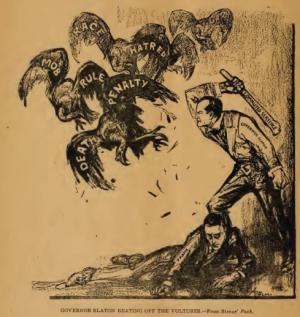
Let any member of the profession turn to his Blackstone, Book IV., Chapter XXXI., and refresh his memory as to the pardoning power.
All crimes in England were supposed to be committed against the King—who was assumed to be present, all the time, in his courts. The crime having been committed against the King, it was his royal prerogative to forgive it.
The King never re-tried a case! Such a thing was preposterous.
The King never set aside verdicts and overruled his judges. Such a thing was inconceivable.
Blackstone expressly says that it would be against all correct principles to allow the power of judging and of pardoning to vest in the same person.
Blackstone quotes the great legist, Montesquieu, who lays down the profoundly wise proposition, that if a magistrate exercised both the power to judge and to pardon, such a combination of separate powers "would tend to confound all ideas of right among the mass of the people; as they would find it difficult to tell whether a prisoner was discharged by his innocence, OR OBTAINED PARDON THROUGH FAVOR."
Chancellor Kent, in his Commentaries (Vol. I., Part II., par. 283), says, "Policy would sometimes require a remission of punishment for a crime certainly ascertained. The very notion of mercy implies the accuracy of the claims of justice."
In none of the authorities can you find support for the idea that the Executive has power to retry, and to pardon, because, on this re-trial, he reaches a different conclusion from that reached by the jury, on the same evidence. For an Executive to exercise the functions of trial judge and traverse jury, is to confound all principles of separate powers, and to bring administrative anarchy upon the State.
Now, when the pardoning power was written into our Constitution, along with the explicit separation of the right to try (judicial) and the right to extend mercy (executive), such lawyers as Jenkins, Reese, Matthews, Pierce, and Toombs never dreamed that any sane man would contend that the pardoning power in Georgia took a new, radical, and chaotic departure from the Laws of England.
When the Constitution of 1877 gave the pardoning power to the Governor, it also put him upon notice that he must not exercise the power without a reason, which he must communicate to the Legislature.
The two constitutional clauses must be construed together; and when so construed, in the light of English law and practice, they mean, that the Governor's reasons for executive clemency must be such as the Legislature will approve; and such as will show to the people that he did not act capriciously, did not arrogate to himself the right to set aside the verdict, and did not usurp the functions of a Supreme Court of review.
The prohibition of judicial powers to the Governor, meant, that the executive must act upon something which occurred after the courts got through with the case; or upon some mitigating circumstance which tempered justice and softened the punishment of the guilty.
The Constitution never meant that a Governor could say, "I have re-tried this case, and return a verdict of Not guilty."
Nor did the Constitution ever mean, that the Governor should say—
"I have re-tried this case, and find a reasonable doubt."
The Supreme Court has often said that; but no Governor ever said it, until Rosser's partner got hold of one end of the Frank case.
HOW DID SLATON ACT IN OTHER CASES?
Consider how differently Governor Slaton acted in the case of Nick Wilburn, of Jones County, last year.
Nick Wilburn had grown up in the backwoods, was a mere common clodhopper, never went to Cornell College, and never had girls under him working for five dollars a week. The Devil, in the shape of a woman, tempted him to eat the forbidden fruit, and he did eat. His sin was a grievous one, and grievously he paid for it.
Governor Slaton refused to commute Wilburn's sentence, and in declining to do so, said:
"Twenty-three grand jurors, twelve petit jurors, a judge of the Supreme Court, six judges of the Supreme Court, three Prison Commissioners, all under oath, have declared the guilt of Nick Wilburn, and that the extreme penalty of the law should be imposed.
"I am sworn to uphold the law, and enforce it. I sympathize with the family and friends of the defendant. It is a great pity that punishment cannot be limited to the offender.
"If I commuted the sentence in this case, it would be equivalent to repealing the section of the Code which provides for capital punishment. It is not in my province to make laws, but to enforce them.
"The responsibility for the verdict is not upon me, but the responsibility would rest upon me, if I interfered with the decrees of a judicial tribunal without good cause."
What caused the change to come over the spirit of Slaton's dream, between June, 1914, when poor Nick Wilburn swung, and June, 1915, when Leo Frank was slipped away from Atlanta in a Pullman Palace Car?
SLATON HANGED A GEORGIA BOY, AND BOASTS OF IT.
In the Chicago Daily Tribune, the fugitive ex-Governor of Georgia said, on July 10, 1915:
"They said I am afraid to allow a man to hang. This is untrue.
"I allowed a boy of only eighteen years to go to the gallows."
The Georgia boy whose death on the scaffold is cited by Slaton as a proof of his courage, had never been in the habit of debauching $5-a-week work girls, nor had he ever been seen to commit the crime of Sodom, nor did he rape and murder a little girl who ought to have been at school.
Therefore, Mr. Hearst did not send Clarence Shearn to Atlanta, to reverse the Supreme Court of Georgia in that case. Doctors C.B. Wilmer and Jake White did not ascend the Throne of Grace in behalf of just a plain common, unromantic Georgia lad, who had killed a man.
It required all the peculiar horror, loathsomeness, and atrocity of the Leo Frank case, to arouse that morbid interest—that weird fascination exerted by the crimes and criminals that are abnormally hideous—to influence the sensational Hearst, to enthuse Mary Delaney Fisher, to capture the Doctors of Divinity, and to set idiots to signing petitions.
In that case, also, the older of the criminals, Jim Cantrell, had been hired by a wicked woman, and he fell into her toils. Bartow Cantrell was a 17-year-old boy. He was wholly under the influence of his elder brother, and he had probably always done as Jim bade him.
At any rate, he took part in the murder, not on his own initiative, and not for his own purposes, but at the instigation of Jim Cantrell and Mrs. Hawkins, the woman in the case.
The Cantrells were brought up in sordid surroundings, and discreditable conditions. In the midst of civilization, they were left untouched by the ennobling influences of Church and State. In the midst of Christianity, a Bible was never put in their hands, until both the Church and the State said to them, "Prepare to meet your God!"
THE LAW IN THE CANTRELL CASE.
In refusing to commute, in the Cantrell case, Slaton wrote:
Under my oath I must uphold the law. It is not my province to make laws, but to execute them. If the people do not believe in capital punishment, it is the duty of their representatives to repeal the law which provides for it.
The appeals that have been made for clemency by good men and women are the promptings of kind hearts and sympathetic natures. Oftentimes apparent severity is really philanthropy, and the enforcement of the law in this case may be the protection of many an honest fireside in Georgia, and may afford security to many an honest husband.
The majesty of the law must be vindicated, and those whose kindly impulses urge them now to request clemency will in their more thoughtful moments recognize the necessity for law enforcement as a protection to the civilization of our State.
For the reasons stated, I cannot interfere, unless at the same time I am willing to make the declaration that, while Governor, the law of capital punishment shall be repealed. This I am forbidden to do by my oath of office.
This July 30, 1914.
JOHN M. SLATON,
Governor.
SLATON, AND ANOTHER CASE OF "CIRCUMSTANTIAL EVIDENCE."
In September, 1914, there was an effort to save the neck of an old Georgian, made by some people who had little money, and no organization, and no subsidized daily papers, no Doctors of Divinity, and no Hearst-Ochs-Pulitzer-Straus combine, and no champions among the snobs who are Slaton's "best people."
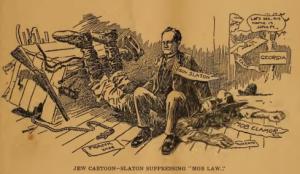
The old man was named Umphrey, and he was nothing but a tenant farmer. He was convicted, on purely circumstantial evidence, of having killed his landlord. He was sentenced to death; and there were a few generous Georgians, in and around Dalton, who took pity on the old man—upon whom a motherless daughter of thirteen years was dependent for a support.
But Slaton felt no pity; he devoted no anxious days and nights to the study of that case; he made no mysterious visits to New York while that case was pending; and he had nothing to say against circumstantial evidence, then.
His snobbish soul could see nothing to appeal to him in the case of a condemned man who would not look nicely in the parlor of a Peachtree palace, or in the elegant quarters of an Atlanta Locker Club.
In the Umphrey case, there were no unscrupulous lawyers so highly paid that they forged a letter of a dead Judge, to use it before a Governor who must have known it was forged.
Who cared for the old tenant?
He had no money; he had few friends, and these few had no more money than himself.
Hang him! Hang him on circumstantial evidence! Hang him, and leave his little girl to the cold mercies of the world—a world in which she can do what Mary Phagan did, work where Mary Phagan worked, and fall a victim to some rich employer's lusts, as Mary did!
And they hanged him, nine months before Slaton repealed the law of capital punishment, abolished the jury system, obliterated two Supreme Courts, and rode into Fame on a pretended mistake of law, and a forged letter of Judge Roan.
When Slaton told the New Yorkers that he meant to retry Leo Frank, and when he kept his word to those millionaire New Yorkers by going through all the evidence, visiting the factory, experimenting with the elevator, and listening to the most elaborate arguments on the details of the record, he cut loose from the laws of England, cut loose from the established practice of centuries, cut loose from the Constitution he swore to support, cut loose from the anchorage of honor—and flung himself upon the shoreless Sea of Shame.
The maddening thing to the people of Georgia, is, not that one man's life has been spared, but that Jew Money has done for a foul Sodomite and murderer, a thing that shatters all precedents, nullifies the highest law, sinks juries and courts into contempt, brings upon us a sickening consciousness that our public men and our newspapers are for sale, weakens the defenses of every poor man's home, and adds to the perils that beset every poor man's child.
Ah, it is a sad day for Georgia! At last we know that a poor man's home, and a poor man's child, counts for nothing when Big Money starts out to muzzle the papers, libel the State, invent a case which does not exist, hide the case that does exist, and defeat the Law as laid down by the greatest tribunal in the world.
Woe to the State, in which the poor man has just cause to ask—"Where is my protection? Where is the strong arm that should be my sword and shield?
"Where can I put my child to work, and feel that she is safe?
What has become of my rights, my safeguards, my dependence upon Justice?"
Woe to the State! when the poor man has just cause to say—
"I am nothing! They only show me consideration when they want my vote, and when they put a gun in my hand to fight out the rich man's quarrel.
"I am nothing! The laws they make are against me. The burden of life is all mine, and none of the ease and enjoyment.
"I am nothing! If my boy—my boy whom the State neglected—commits a crime, he swings for it; but if some rich man's son lusts after my daughter, lays in wait for her, leads her into a trap, assaults her, and kills her—I am asked to respect the Law, while the Law is hiring automobiles and parlor cars to take her vile destroyer into a fake imprisonment!"
GOVERNOR SLATON HAS A CLANDESTINE MIDNIGHT CONFERENCE WITH HIS PARTNER ROSSER!
It was generally believed that the Frankites had won over two members of the Prison Commission. When it became known that R.E. Davison had disappointed them, and that Paterson alone had voted for commutation, the Frankites were uneasy. They had failed in every court, had failed before the Commission, and were left with a Governor who was known to be a most uncertain quantity. It became an urgent necessity for some strong Frankite to see Slaton at once, and brace him up.
Rosser to the rescue!
The case was on its last legs, and between New York and Atlanta rich Jews wailed lamentably, during the few hours before Rosser got hold of his tricky partner. These two noble men loved the darkness at that time, for reasons that have always been considered sufficient. So, the noble Rosser went up a back street in his automobile, late at night, stopped it a block or two away from the Governor's; and footed it through the alley, like an impecunious person who desired to purloin the portable property of an unsuspecting fellow creature.
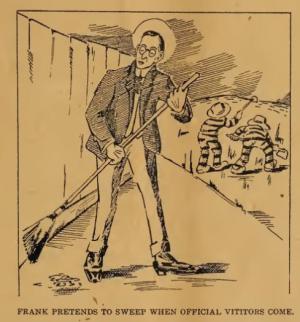
Rosser went into the home of Slaton, and remained for hours, and until after midnight.
What Rosser said to Slaton in this clandestine meeting, will never be known; but it was noticed that next day the lamentations of the Jews were replaced by sly grins, and offers to bet ten to one that Slaton would commute!
Read the following, not as evidence of Frank's guilt, or as proof of Slaton's hypocrisy and perfidy, but as a side-light on events in Atlanta:
Atlanta, June 22.
Mr. Tom Watson:
What I tell you I know to be true as God is light, and it is this: The Jews all gathered at the home of the Seligs, on Washington Street, where Frank's wife and father-in-law live, and from 8 till 12 o'clock, they had a regular old-time Belshazzar feast. They drank wine, high balls, whiskey and beer, and smoked and sang, and had music; and there were not less than a hundred and twenty automobiles full of Jews that came there from the time I say to the late hour.
Now, they all knew Slaton had commuted Frank, and were celebrating it.
And I know a policeman who was on the streets yesterday, to make out like controlling the mob, and he told me he passed the jail every night at 12 ‘clock for a year, and going on duty, and never saw a light in the office of the Sheriff till Saturday night, and he was surprised to see the Sheriff sitting there like he was waiting for somebody, and suddenly a Jew came running up and tapped on the window, and the Sheriff raised the window and the Jew whispered to him, and the Sheriff smiled, and then the Jew ran off and the Sheriff closed the window. Now, that showed conspiracy, and that Slaton was working with the Jews all the time.
In other words, the Jews knew—some on Friday, and some on Saturday—that Slaton had commuted the sentence.
Defending his action, Slaton published an article said to contain 15,000 words, nearly half of them devoted to an attack on Conley, and the other half to misrepresenting the official testimony of the white witnesses. He pretended not to have reached a decision in the case until 3 o'clock Sunday morning. It was said that he signed the commutation a minute after the midnight of Sunday.
When it became known that the Governor had actually re-tried the case, on the same old evidence that had been so often, and so thoroughly threshed out in the courts, the State seethed with indignation.
It was felt that Slaton had usurped an authority not vested in him by the Constitution, and that he had established the principle of, One law for the Rich, and another for the Poor.
In the Wilburn case, he laid down the law correctly; in the Cantrell case, while he was hard as adamant, he was right as to the rigorous letter of the law; in the Frank case he reversed himself at the same time that he reversed all the Courts. Why the difference? There is but one answer: in the cases of Wilburn, Cantrell, and Umphrey, he was not of counsel for the accused, AND, IN THE FRANK CASE, HE WAS.
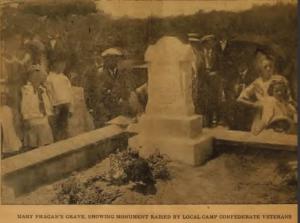
Leo Frank is now at the State Farm, an honored guest of the managers, awaiting his triumphant release from even the politely formal fetters of the Law.
His little victim, whose upraised hands—fixed by the rigor mortis—proved that she had died fighting for her virtue, lies in Georgia's soil, amid a grief-stricken, and mortified people—a people bowed down by the unutterable humiliation of having been sold out to Jew money.
On the heights from which the immortals look into the lives of human beings, how vast must seem the moral distance between the little girl, who died, rather than soil the purity that God gave her, and the Governor, who brought this eternal disgrace upon himself and our State!
A child died a heroine's death, and sleeps in a heroine's grave; the man is pilloried in eternal infamy.
We gave him a clean commission; and he returned it to us, covered with filth.
The Constitution which he swore to respect, he trampled into the mud.
The great Seal of State went, LIKE A THIEF IN THE NIGHT, to do for an unscrupulous law firm, a deed of darkness which dared not face the sun.
We have been betrayed! The breath of some leprous monster has passed over us, and we feel like crying out, in horror and despair,
"Unclean! UNCLEAN!"
When John M. Slaton tosses on a sleepless bed, in the years to come, he will see a vivid picture of that little Georgia girl, decoyed to the metal room by this satyr-faced Jew; he will see her little hands put out, to keep off the lustful beast; he will hear her cry of sudden terror; he will see her face purpling as the cruel cord chokes her to death—and John M. Slaton will walk the floor, a wretched, conscience-smitten man, AND HE WILL SWEAT BLOOD!
Many, many years ago, there was a sermon preached at Thomson, by a man whose life was as pure as crystal, and who, now and then, was lifted into a simple eloquence that moved all who listened. John M. White was his name—peace to his soul, for he is dead, and I loved him well.
He was speaking of Duty, of the higher path, and the old land-marks; of the honor that a man should guard, as a woman guards her virtue.
He told of the little ermine of the far North, the tiny creature of the snows, the unsullied Diana of the silent woods, so true to its instinct for purity, so loyal to the white drapery that God had put upon it—that the hunters, seeking its life for its priceless fur, smeared filth around the burrow where the dainty thing lived; and how this little dumb brute, shrinking from a vile contact which would soil its spotless covering, fell into the hands of its enemies—preferring death to contamination.
Are the old lessons lifeless? Are the old glories gone? Are there no feet that tread the old paths?
Once, there were men in Georgia—men who were afraid of nothing, save to do wrong; men who sprang to arms, and went to death, on a bare question of principle; men who would no more lie than they would steal; men who flamed into passionate indignation when a legislature was believed to have disgraced the State; men who caught the fire from the heavens to burn a law which outraged Georgia's sense of honor and justice.
The sons of these men carried the Grey lines, and the tattered Stars and Bars farthest up the heights of Gettysburg; met the first shock of battle at Manassas; led the last charge at Appomattox.
And the songs of these Georgians are today bowed down with unspeakable grief—for they feel that our grand old Empire State HAS BEEN RAPED!
Like the Roman wife of old, we feel that something foul, something unutterably loathsome has crept to bed with us, and polluted us during the night; and that, while the morning has come, it can never restore our self-respect.
We have been violated, AND WE ARE ASHAMED!
Note: Wm. J. Burns has stated that he was employed by the State of Georgia, worked on the case a week, and reported that there was no evidence against Leo Frank.
Burns was never connected with the case at all, until after our Supreme Court had carefully reviewed the evidence against Frank, and declared it amply sufficient to show his guilt.
Burns was never employed in any capacity by the State of Georgia.
Second: Governor Slaton has told it all over the North and West, that Judge Roan requested a commutation of Frank's sentence.
This statement is false. Judge Roan continued to say, notably to his pastor and his daughter, that the evidence unquestionably demonstrated Frank's guilt; and not until Judge Roan had been dead more than two months, was a forged letter presented, which stultified Judge Roan's record, and contradicted his judicial declarations, of record in this case.
THE END.
* * *
MAKE SURE to check out the FULL American Mercury series on the Leo Frank case by clicking here.
Transcribed by Penelope Lee. Exclusive to the American Mercury.
Introduction
Tom Watson: The Leo Frank Case
Tom Watson: A Full Review of the Leo Frank Case
Tom Watson: The Celebrated Case of The State of Georgia vs. Leo Frank
Tom Watson: The Official Record in the Case of Leo Frank, a Jew Pervert
Tom Watson: The Rich Jews Indict a State!
- Tom Watson: The Leo Frank Case, Watson's Magazine the Jeffersonian Monthly, January 1915 [Last Updated On: July 26th, 2024] [Originally Added On: August 31st, 2021]
- Tom Watson: A Full Review of the Leo Frank Case, Watson's Magazine the Jeffersonian Monthly, March 1915 [Last Updated On: July 26th, 2024] [Originally Added On: September 1st, 2021]
- Tom Watson: The Official Record in the Case of Leo Frank, a Jew Pervert, Watson's Magazine the Jeffersonian Monthly, September 1915 [Last Updated On: July 26th, 2024] [Originally Added On: September 3rd, 2021]
- Tom Watson: The Rich Jews Indict a State!, Watson's Magazine the Jeffersonian Monthly, October 1915 [Last Updated On: July 26th, 2024] [Originally Added On: September 4th, 2021]